#cos meta
Note
How would you approach the concept of Darklords?
for my campaign i always approached the darklords as a cautionary tale (hence humanizing strahd being so central to my campaign) and images of what the party could become if they gave in not necessarily to their base desires but if they disregarded everything to get what they wanted. the darklords in this case are closely connected with dark powers checks as the powers themselves close in on new targets to create new points of suffering. the actions taken by my players to warrant a dark powers check then need not be outwardly evil but rather selfish and in pursuit of something they'd do anything for - a clue that the darklords did not get to where they were because of a broken moral compass but instead because of how willing they were to get what they want, how desperate they became in that pursuit. that it was not the end that damned them, but the means they employed to get there
since i see them as having ultimately damned themselves i try to include an element of potential redemption in their stories as well. that redemption need not be atla zuko style but also darth vader-esque where connections to the party/loved ones can inspire the ultimate sacrifice and renunciation of what these darklords gave up everything for
22 notes
·
View notes
Text
"I've been waiting for ages for somebody to unmask them."

This moment tends to elicit negative reactions in a first read through, and I've got some opinions about why where Kabru is coming from here actually makes a lot of logical sense. So I thought I'd elaborate on that.
I think people hear this and go, "He thinks they must be hiding something because they gave money to someone? What a cynic." Or "he dislikes them because they did charity?? What's wrong with this guy!". And obviously, a lot, a lot is wrong with him. But I think this makes more sense than it seems at first glance! What people evaluating this judgement miss is why Kabru is paying attention to Laios and co to begin with.
Kabru knows of the Touden siblings because (he's a little bit of a stalker-) he is keeping an eye on all the relevant parties in events developing on the island, in order to be able to guide them to his preferred outcome. This includes adventurers because they are the ones actually exploring the dungeon! He's well aware that something as minor as internal tensions between party members could be key to the historical events that are developing. (He would love the assassination of Archduke Franz Ferdinand.)
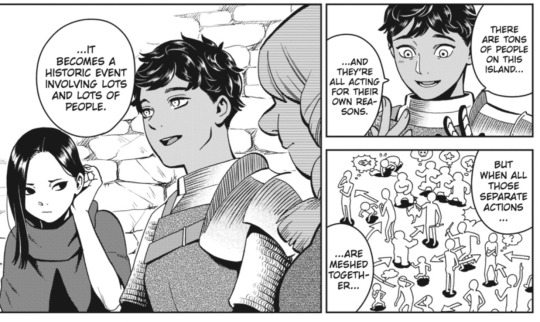
His desired outcome is that whatever the rewards are of breaking the dungeon's curse, whether that's kingship or the ancient elven secrets of dungeons, are claimed by:
A) a short lived person
B) Someone who will be a good, effective leader and/or use those secrets and the power they carry wisely, with foresight, and to establish a political bloc for short lived people.
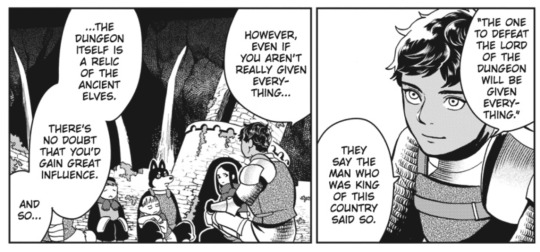
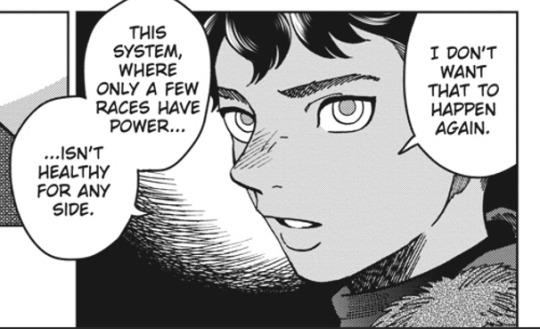
The person he can best trust to do this is, of course, himself. But due to his PTSD regarding dungeons and monsters, he's not able to develop the necessary skills to conquer the dungeon. Once he realises this, he starts looking for someone else who he can support to that end.
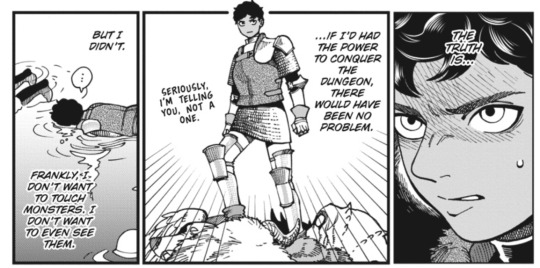
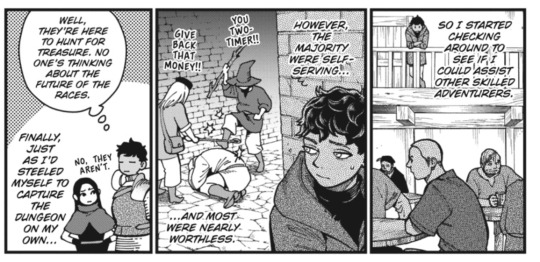
But most of the adventurers don't have any intentions of conquering the dungeon, don't have the skills, or are unsuitable in other ways. In fact, it seems like some potentially suitable people are the Toudens. There are a lot of good rumours about them going around - they actually seem to have a very positive reputation! That's what Kabru means when he says "unmask".

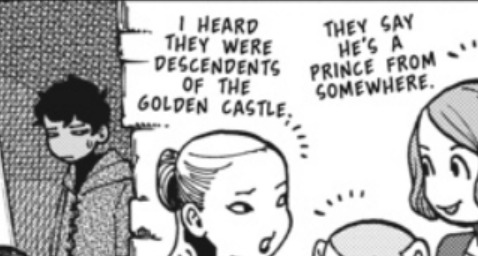

So when Kabru is observing something like them giving money to an old comrade from their gold-peeling days, he doesn't consider it a problem because "they're giving money to this person who doesn't actually need it" or because they must have some dark secret if they act superficially nice. I think he actually understands this situation and what it implies about Laios (in particular) perfectly well.
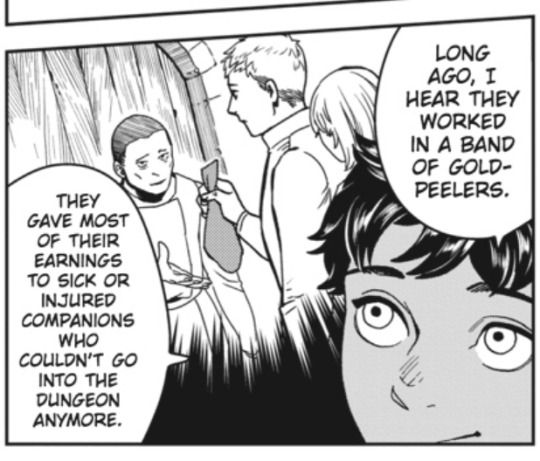
Laios and Falin gave money to an old comrade who got injured and couldn't work. That person then healed up but kept taking their money. Then he used the money to start smuggling illicit goods to the island.
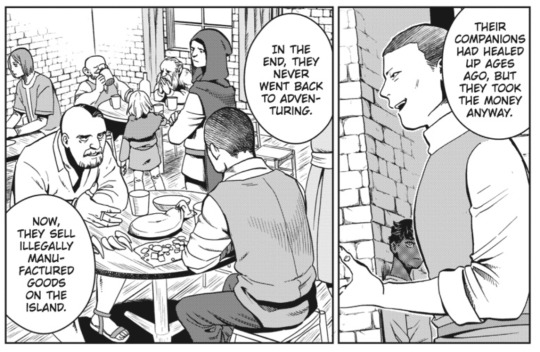
The key is that for Kabru, the problem here is the same as with the corpse retrievers - people using the dungeon's resources to fuel dangerous, selfish, or violent pursuits cause problems for the island, attract more criminals and people with motives other than breaking the curse, and increase the chances of the whole situation ending in tragedy.

Kabru is willing to work with the Shadow Lord of the island if it gets him to his goal - he isn't scrupulous - but the criminal element of the island increasing is something he sees as a major issue.
Also, when you're evaluating someone as a candidate for power, riches, secrets, potentially kingship - then being curious about how the money you give to people is going to be used is kind of a relevant trait!
Interpersonally, Kabru's actually very easygoing - I mean, Mickbell isn't exactly an upstanding guy, is he! But Kabru likes him and they get along well. These traits wouldn't be a problem at all in a friend, or a comrade, or someone Kabru was confident he could use. But he can't get a handle on Laios, and Laios is someone who has the potential to be a major player!
On Laios' end, this is the same as with the marriage seeker who joined their party. She kept asking for things and he gave them to her, because he tries to be nice to others. He even gives her money! It's the exact same thing.
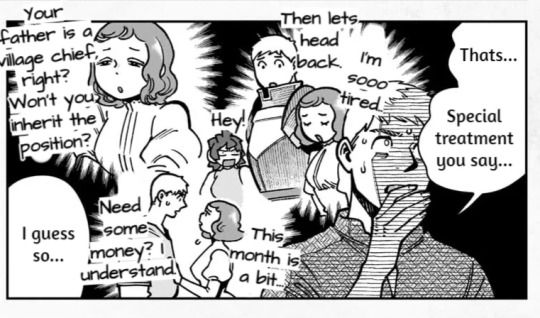
That's fine, but it became a problem because he basically wasn't interested in her motives, didn't notice she was trying to manipulate him, and it also didn't occur to him that the other party members would notice or be affected. We can assume the situation with the gold peeler is the same. When Kabru says that "It's not that they're bad people, they just aren't interested in humans," he isn't wrong.
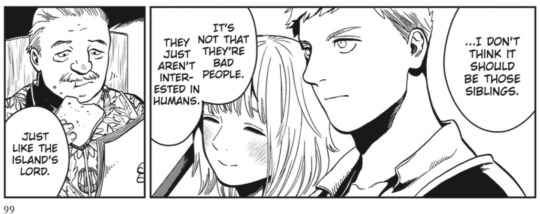
The extent to which this is true of Laios is linked to his autism imo, (because it isn't just disinterest - he genuinely isn't able to notice nonverbal cues that people are lying to him or have ulterior motives) but to a greater or lesser extent I think it's a very common trait. Most people aren't actually that interested in other people who aren't close to them. Kabru is the weird one here. It isn't an issue except as a leader - which is why we see an immediate comparison to the Island's Lord, because that's how Kabru is evaluating them.
And disinterest in/lack of ability with people to the extent Laios exhibits it, it does, actually, make him a worse leader... it's just that as we see in the story, people can help him out. The rest of the party tell him the marriage seeker is taking advantage of him so he tells her he can't give her special treatment anymore. They're pissed and it's a crisis point - he couldn't have recovered their trust without Marcille and Falin - but that's exactly the point. With Marcille and Falin, he was able to recover their trust.
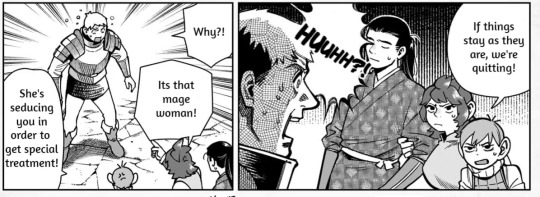
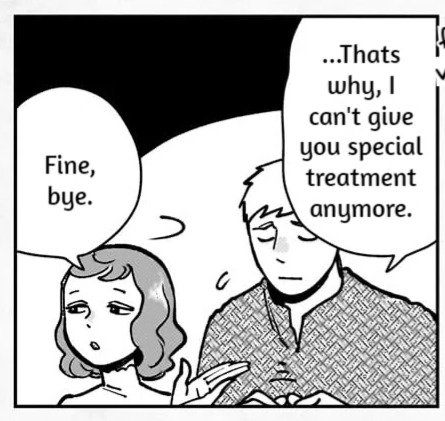
And he has other good traits that make up for it, such as his intelligence, strategic knowledge, open-mindedness and sense of fairplay.
Kabru doesn't disqualify Laios as a candidate based on what he sees about him from afar, though - he still tries very hard to get close to him, obviously hoping that if he manages he can steer Laios to defeat the dungeon and make up for his lack of people-skills in the aftermath. (Which... he does eventually achieve that goal!) He completely fails until the events of the story, so... definitely I think "They just aren't interested in humans" could also partially be a stung reaction to Laios' complete disinterest in him.
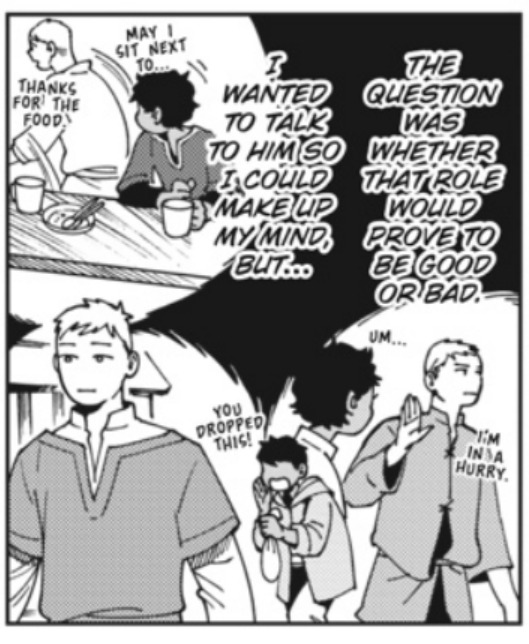
Anyway, that's my read on what exactly Kabru's "issue" with Laios is. Obviously, once he does find out what Laios' true nature is like - about his love for monsters - he develops an entirely new set of fears about Laios' priorities. But since Laios kept that a secret until the start of the story, he has no idea of that yet.
Given all that, I think it's interesting that he says that he doesn't think that the Toudens are suitable to defeat the dungeon, and that he's hoping they'll turn out to be the thieves. As some of his few potential candidates, people who he thinks may play a big role in the island's future, you'd think he'd hope they would be good people!
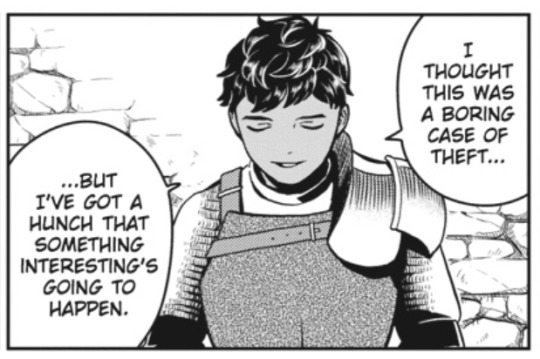
I suppose it's better, in his eyes, because it means that he's involved in something "interesting". They haven't just had their stuff stolen by regular criminals (boring, puts them further away from his goal) - they've been caught up in the beginning stages of "a historic event". The desperate and dwindling group forgetting morals in their quest to retrieve their lost comrade probably appeals to his sense of melodrama. Because he also just... loves drama.
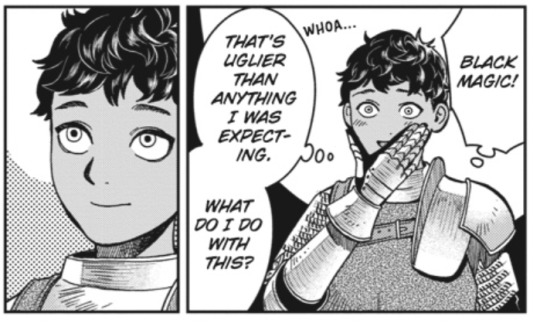
Despite it being "uglier than anything he was expecting", he still pursues Laios as the person he wants to conquer the dungeon pretty much as soon as it becomes clear that he won't be able to do it himself and they are out of time. That's because... well, to be fair, there aren't any other options. And he fits standard A: he's short-lived!
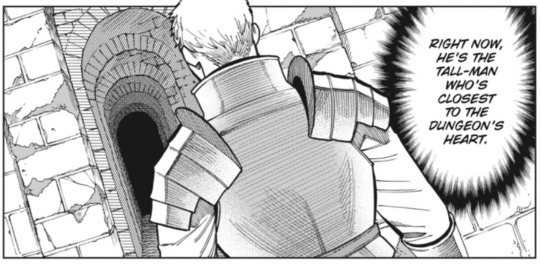
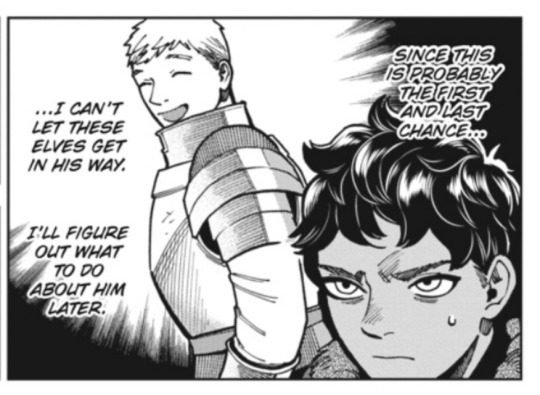
and Kabru still hopes he can fit standard B, too, and be persuaded to use the power he wins for good. No matter how many nightmares he has about Laios, or whether he thinks about killing him. He doubts him, but ultimately he puts his faith in him and seems happy after the manga's ending that he made the right decision.

#dungeon meshi#dungeon meshi manga spoilers#dungeon meshi meta#kabru of utaya#laios touden#labru#laios x kabru#dunmeshi#og post#kabru is such a big picture thinker. and he evaluates people more than he judges them imo#the hater jokes are funny but the people he judges most harshly arent laios and co. they're people like the island's lord.#but you don't see that as clearly because he isn't interested in the island's lord. he understands him. finds him contemptible but useful.#whereas laios lives in his brain rent free because he WANTS to understand him but doesnt quite.#even though he sees the elves as a major threat to his ultimate goals and dislikes the way they treat short lived races#he still understands and evaluates mithrun as an individual based on his own merits#he's one of the characters who is least judgemental in that sense because while he's always making judgements and evaluations#he's also constantly revising them whenever he gets more information#my beautiful machiavellian prince <3#it's genuinely a really laudable way of understanding others imo.#the only problem is that because he's driven towards his goals by his PTSD and survivors guilt#he pushes himself into situations (the dungeon and also interpersonally) that trigger him or even just upset him#without regard for what he authentically wants or his own wellbeing.
4K notes
·
View notes
Text
Y'know, I think I figured out why the Hells still feel like a new low-level party to me, even though they're level 13 and almost 100 episodes in.
I don't quite think it's the lack of conversations, or the fact half the party's plot hooks are big ties to past campaigns - though that definitely plays a part.
... Bell's Hells still primarily rely on quest givers.
Most of their goals are given to them and do not feel organic to the party, and constantly remind us that the Hells are pretty much never the most powerful people in the room. Which is usually something you see with a low-level party.
NPCs offering jobs is not a bad thing; it's a very common plot hook. Matt has been extremely skilled with using NPC quest givers in those two campaigns. Not only do they provide an obvious plot thread, but they can put the party in the path of others (say, the Nein running into the Iron Shepherds while doing a job for the Gentleman and everything that came of that). And the Hells had a solid start with it too - Eshteross was an excellent quest giver!
The problem is that Bell's Hells have never really not had a quest giver.
Maybe it's a byproduct of the more plot-heavy structure of this campaign? But while prior parties have felt like they decided on their course of action and what they prioritized, Bell's Hells feels less like level 13 (13! Level 13!) experienced adventurers and more like an MMO group clicking on the exclamation point over an NPC's head. Where does the plot demand we go next? Who do we report back to?
They're level 13.
At level 13, Vox Machina had just defeated a necromantic city-state to clear their name and Percy's conscience. And, you know, the Conclave just destroyed Emon. No one was explicitly telling the group to gather Vestiges and save the world (though Matt guided them there), and they were usually among the most powerful people in the room. They chose which Vestiges to prioritize, which dragons to tackle when, even if the over-all plot was pretty clear.
At level 13, the Mighty Nein were celebrating Traveler Con (another PC goal, I'll note) after brokering peace between two nations, accidentally becoming pirates and heroes of the Dynasty. The Nein regularly chose what to do based on personal goals, not grand ones. Though definitely smaller fish than Vox Machina at this level, they were very independent and gaining solid political clout.
While we're at it: level 13 is one level lower than the Ring of Brass, who had a huge amount of sway over Avalir. They ended the world, and also saved it, while in the grand scheme of things being only a smidge more powerful than Bell's Hells are now.
Can you really see the Hells wielding that amount of influence, when they're constantly being told what to do next?
The god-eater might be unleashed, so Bell's Hells have no time to do anything but what is asked of them. No time for therapy unless stolen from Feywild time, no travel on foot and late-night watches. They haven't even had time to grieve FCG. Percy was grieved in the middle of the Conclave arc. Molly was grieved when half the party was still in irons.
Matt is in the very unfortunate spot of not being able to give the Hells the same agency as the other two parties. Not only because of the world-ending plot introduced so early on; they are surrounded by characters they know (and the cast knows) are stronger and wiser than them - the familiarity of the past PCs and NPCs is to their disadvantage.
Why would the party reasonably ignore Keyleth's task that will help save the world and go off on a romp? Why would the cast when they know well Keyleth has to be sensible and with the best intentions in mind? The stakes are just too high.
It means that the Hells still feel like they're running errands instead of pursuing their own destiny. Their accomplishments are diminished as just being parts of a to-do list, and any stakes feel padded by several level 20 PCs/NPCs standing 5 steps away ready to catch them.
This isn't Bell's Hell's fault, nor is it Matt's. It could be amended, I think, if the Hells are really left to their own devices for a long period of time without support and shortcuts (like during the party split)... which would be really tricky to pull off at this point in the campaign.
They're level 13. They're big fish, but they're stuck in a pond full of friendly sharks, so they don't feel big at all.
#critical role#campaign 3#bells hells#cr meta#critical role meta#the percy's conscience thing is half a joke. i love him but man he rlly went there just for the Vengeance. this isnt about him tho#to quote burr: we rlly spent the entire campaign on imogen and orym's backstories and everything else is sidequests#it's just. god. the constant hand-holding paired w the fact there's no TENSION from the fact they're taking the orders#the Nein were allergic to quest givers partially bc they rightfully didn't trust them. But the cast and audience trusts Keyleth and co 100%#it feels like you could put any other characters in this group and Of Course they'd still do roughly the same things on a macro scale#i love Orym and Liam's intent behind the character. but i. think it all boils down to his strong connection w Keyleth ;;#because of Course he'd reach out when things got bad. and of Course they would turn to her for advice.#the other three parties mentioned could Say Things and they would get Done. kinda iffy for the Nein but they could still boss ppl around#who can the Hells delegate smaller tasks to? ask to spy for them? deal with arcane batteries? no one! Because they ARE the small guys!
719 notes
·
View notes
Text
In rewatching the season, I'm noticing how clever Aabria and Brennan were in crafting Tula's story. How well thought out everything was.
Specifically, the bear. It's been mentioned so many times before, but with the context of the completed season, I cannot help but be in awe at the skilful storytelling at display here. The way in which the Blue is described to appear wrong only in reference to Tula and her heart, the way in which Tula talks about curiosity and and having experienced knowing someone who died because of it. Of how Aabria describes to Izzy how Tula looks when she heals the bear, of how Aabria specifically points out that Tula recognises the commonalities between herself and the bear. These breadcrumbs that mean little in the beginning, that tell everything at the end. It's amazing, stunning, masterful storytelling. I am in awe.
#text_loke#meta from loke#Burrow's End#Burrow's End Spoilers#Aabria Iyengar#Brennan Lee Mulligan#i am forever in awe tbh#also the way i gasped at several of brennan and aabria's lines this episode#i'll need to pull some quotes from that whenever i get on my computer#and i desperately need to write a fic about everything that happened from Tula's perspective#but that would be AFTER i finally manage to finish the little beast i'm working on about that Last Fight from Tula's pov#'cos BOY i have a feeling i will write a lot. just 600 words on the intro before 'kill them all'. so y'know. a wordy little thing...#anyway. i love burrow's end so much. i cannot stop thinking about it#Dimension 20 Spoilers#D20 Spoilers
1K notes
·
View notes
Text
Kind reminder that the A. Z. Fell & Co. bookshop was designed by Aziraphale as:
An Eden to return to — for him to guard, for Crowley to feel safe in;
A giant compass showing the directions of the world.
No matter how lost either of them is, they’ll use it to find each other.
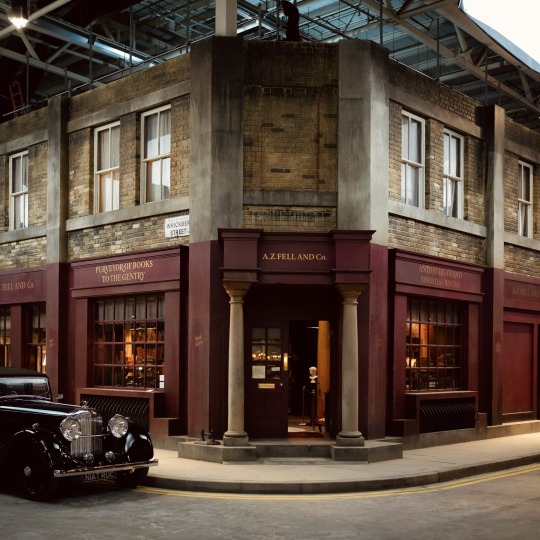
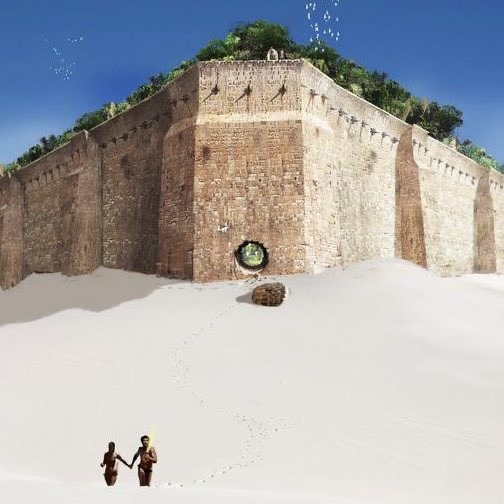
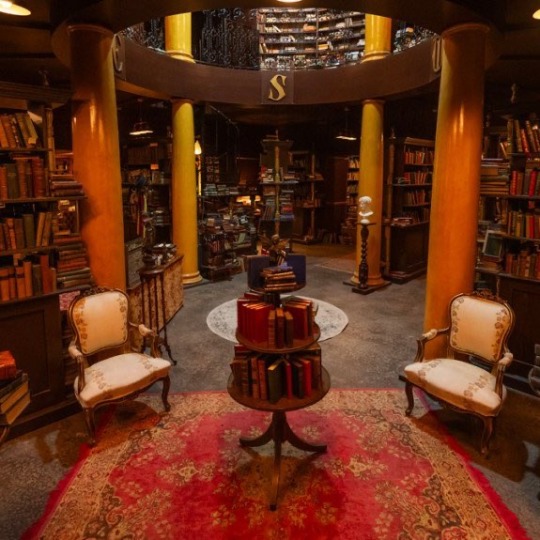
#the invisible and unbreakable line that joins crowley and aziraphale#is the same as the one that joins the compass needle and the north#no one is really lost as long as they stay on their own side#ineffable husbands#aziraphale’s bookshop#a. z. fell & co.#good omens#good omens meta#yuri is doing her thing
870 notes
·
View notes
Text
I'm sure this has been done countless times, but polls are fun and I'm curious, so...
For the purposes of this poll, I'm only counting shows/books/games/etc. where Sherlock is a main or very prominent secondary character, there's a decent amount of other Sherlock canon characters represented (at least a version of a John Watson), and there are some references made to the ACD originals. Not counting where he's only a relative of the lead but not a main (like Enola Holmes, RKDD, etc.)
Not counting the ACD original canon as an adaptation here, as none of these would exist without it. Everything else listed is adapting it in some way.
There's also some series I haven't watched/read yet but have been recommended that aren't on here yet for the purposes of space, including Detective L, Miss Sherlock and the Bonnie MacBird Sherlock books.
Feel free to reblog this for a larger sample size :)
#sherlock holmes#acd canon#acd holmes#yuukoku no moriarty#moriarty the patriot#cbs elementary#bbc sherlock#yuumori#house md#tgaa#the great ace attorney#herlock sholmes#granada sherlock#granada holmes#rdj sherlock#basil rathbone#detective fiction#sherlock holmes meta#my polls#jeremy brett#rdj holmes#sherlock and co#miss sherlock#sherlock holmes in the 22nd century#acd sherlock holmes#sherlock hound#the great mouse detective#polls#detective polls
596 notes
·
View notes
Text
My hottake is that people are trying to fit Lockwood into character archetypes he doesn't fit, because they see "traumatized teen boy with a big ego and a passive death wish" and go "oh. emotionally unavailable asshole character" when that's.....not actually the character we're shown.
He's constantly praising Lucy and George. He's often the first one to try and apologize when he gets into a fight with them. The second he clocks Lucy as a "safe person" he becomes super touchy and holds her hand constantly. He compliments George's cooking. He's visibly proud of the people he cares about and publicly defends them on multiple occasions. He repeatedly asks his team if they're okay and tries to get them to open up when they're having issues. He makes an obvious, conscious effort to repeatedly tell Lucy he believes in her and wants her to stay at Portland Row. He smiles and jokes and laughs around with them on a pretty regular basis. He's also emotionally aware enough to tell Lucy "the reason I haven't talked about this subject with you is because it's relevant my childhood, which I don't like to talk about because it's pretty traumatic" when she questions him ahout Jessica's door, and he's kind of astonishingly open about his trauma with Lucy and George despite generally being unwilling to actually talk about the details.
And this applies to characters other than Lucy and George, too. He compliments Kipps' team during the graveyard fight and clearly respects Flo, for example. He's kind to Winkman's son, is generally polite to his clients, and is affected by the death of the undercover agent to the point of having a panic attack. It's pretty clear he cares deeply about the people around him even as he tries to push those closest to him away so they won't mourn him if (when) he dies.
Like yeah, Lockwood has an ego the size of Manhattan, has enough trauma to fill a boat, and is worryingly flippant about the worth of his own life, but he's not the Asshole With a Heart of Gold archetype. He's not cruel or deliberately mean (at least, not to anyone who's not Kipps). He's friendly and pretty kind to most people most of the time, and he openly cares about his team. And it's a little weird that I'm seeing so many people talk about him like he's not.
#lockwood and co#lockwood meta#anthony lockwood#lucy carlyle#george karim#hashtag not all egotistical and emotionally constipated teenage boys are the same!
5K notes
·
View notes
Text
On the Bookshop, the Concept of Home, and Going Too Fast
So, weirdly enough, I want to start with a scene that has very little to do with the actual Bookshop: 1967. We get Crowley planning a heist and being interrupted by an angel clutching a thermos full of holy water and promising that someday, maybe, they could let themselves have the life they want together. And we get that line. You know the one. You go too fast for me.
This one line of dialogue went a very long way to cementing the fanon perception of their roles in the relationship as we've largely been shown them - Crowley gently pushes and gives Aziraphale space to slowly feel comfortable setting his own boundaries or adjusting his worldview. And I’m not saying this is wrong - it’s definitely what we're primed to expect in their pattern - but I do think it ignores a fairly common variation of their pattern. See, sometimes, Aziraphale is actually the faster of the two of them - he's just not quite as flashy about it.
Crowley very rarely actually does any pushing without getting some kind of signal from Aziraphale first. Aziraphale, whether consciously or otherwise, quite frequently is the player making the first move on their metaphorical chess board. We see that he's the first to push for them to work together in the story of Job. We see that he's the first to invite Crowley to socialize together in Rome. We see as early as the Globe that Aziraphale has discovered and weaponized how to ask Crowley for things with a simple look and that Crowley has gotten very good at reading those asks. We actually see this dynamic in real time as Aziraphale drops signals to Crowley on how he should form his deception of the angels in the Book of Job. Even the Arrangement itself is something Crowley doesn't push for until he knows explicitly that Aziraphale isn't happy with the terms of his work. In other words, Aziraphale sets a cue, Crowley picks up on it and adapts.
So what does this have to do with the Bookshop?
Well. The Bookshop is a prime example of Aziraphale getting there faster. Because the bookshop, whether he knows it at the time or not, is absolutely a nest.
Nesting is behavior typically associated with birds, but is actually something lots of animals do. Even humans exhibit this behavior to some degree. It’s functionally gathering a bunch of stuff to create a safe, comfortable place, typically constructed for the purpose of raising children or attracting a mate. In other words: the creation of a home.
Because the Bookshop is their home. It is their safe space and sanctuary. It is a space for them to meet and just Exist without worrying about being seen. A home base where they can just Be themselves. It’s a constant in a world ever shifting around them. It’s a place for them to come back to. A place that will always be waiting for them both. And a place that they both have to be able to check in on each other. This is why the Bookshop burning hit as hard as it did. Their home was destroyed in fire and flame. And they both know it. Every expression and shift in tone when they talk about it speaks to the gravity of that loss - even if it was only temporary. And I think it was always intended to be just that on some level from the very start.
So timeline wise the closest scene we know about to Aziraphale starting his plans for the shop is the scene at the Globe. This takes place in 1601 and features the two of them being very conscious of being seen and the potential consequences thereof. They pick going to the Globe expecting it to be busy enough to blend into the crowd and Aziraphale's objection re the Arrangement has shifted onto the idea of Hell destroying Crowley.

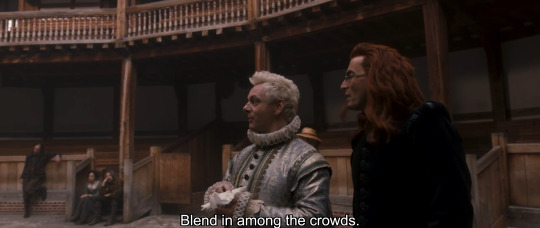
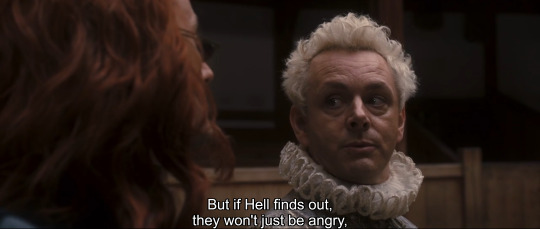
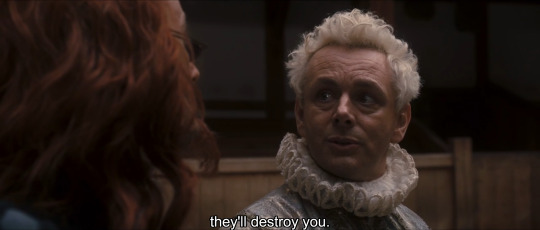
It is less than a century later that Aziraphale buys the land that will eventually become the bookshop. In 1630 he purchases the land with his own money. That’s his money. Money that he made mostly the human way. Although this space would eventually become an embassy to Heaven it was made via earthly means. It’s his, not Heaven’s. Less than 30 years after we first see them express concern for how dangerous it would be to be seen Aziraphale starts making a space for them to retreat to.
And he does it slowly. He spends decades slowly buying up the land in the area. In fact, it’s nearly 200 years before the Bookshop will be ready to open. By the time we hit the Bastille, he’s clearly decided on a bookshop and has clearly told Crowley all about it. They’re comfortable with each other and already trust each other to a frankly absurd degree. Aziraphale risks discorporation on the sure thing that Crowley will know he’s in danger and come save him just because he wants to see him. In other words, by the time they’re at the point where they’re making elaborate excuses to see each other, Aziraphale is less than a decade away from naming the home he has been carefully making for himself A.Z. Fell and Co.
The and Co is important here for obvious reasons. We all know there’s only one person that it could be referring to. Even as Aziraphale is still denying that they are friends, he is plastering the idea that they are a unit all over the front door of his home long before even he realizes that what he is feeling for Crowley is love.
This is part of why the conversation about ‘our car, our bookshop’ comes much easier to Aziraphale. And it is an easier jump for him to make. He's the one that brings it up and he does it quite casually. He's testing the waters a bit, but is confident the conversation will go his way. Of course we have a car. Just as we have a bookshop.
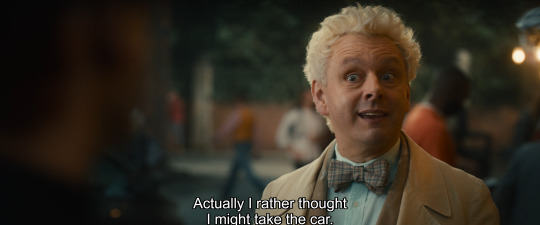

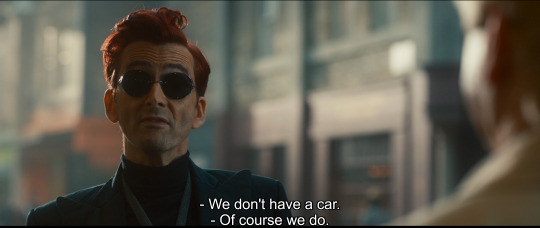
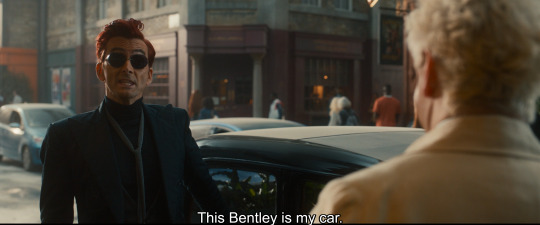


The thing is I don't think Crowley ever really got that memo on a conscious level. We can see his relationship to the shop shift in the way he moves around the shop shifts over time. The earliest we see him in the shop itself is 1941. It's night time which gives the whole thing a bit of clandestine air, which is fitting for where they're at on the timeline. He stays mostly in one spot in his shots here, sort of hovering about the shop not getting too close to Aziraphale but not drifting out on his own either. He also stays as close to sitting normally as we tend to see Crowley ever sit and his glasses stay on. Which that's not to say he doesn't relax at all. He takes off his hat and make himself comfortable and, most telling, doesn't bother with fixing his glasses when they slip off his nose. He's comfortable and familiar here but it's in a strained sort of distant way. There's trust there, for sure, but he is clearly a visitor in this space.
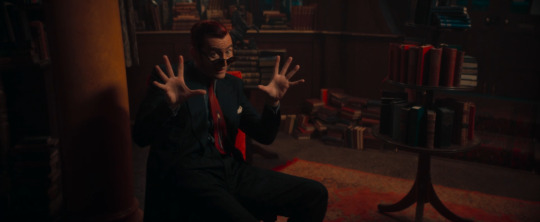
The next we see of Crowley in the shop is the mid 2000s. It's still night time. His glasses stay on until he's drunk and the he takes them off of his own accord. He moves about the shop, touching various objects and leaning against various pillars and shelves and furniture. He's more comfortable here, but he still he needs a bit of alcohol in his system to get there.
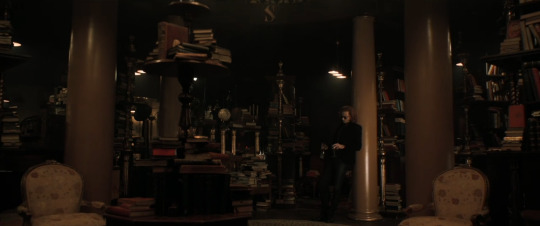
We then see him briefly in the daytime after they realize they have lost the Anti-Christ. The glasses stay on here and alcohol is notably present. And then we do not see him in the shop again until it is burning. All and all most our shots of the bookshop from season one are Aziraphale alone moving about his space. We know Crowley's there enough that his smell lingers in the place, but we don't actually see that much of it beyond those first tom scenes.
Season 2 couldn't be more different in this regard.
Crowley moves in and out of the bookshop as it suits him. At one point he wanders off in the middle of Aziraphale zoning out in a memory without bothering to shake Aziraphale out of it. We even get him doing what is functionally a bird courtship dance right here in the middle of the shop. Aziraphale in turn takes active steps to get Crowley into the shop whether it's leaving him to watch it while he's gone or suggesting that Crowley likes waiting in the shop for him - a thing Crowley does not outright deny beyond objecting to Gabriel's presence there.


And we get a lot of Crowley in the shop this season- both with and without Aziraphale. And regardless of Aziraphale's presence, Crowley's behavior doesn't really shift too much. He's moving around the shop far more that we've ever seen him historically and he spends half that time sprawling on the furniture like it's his.
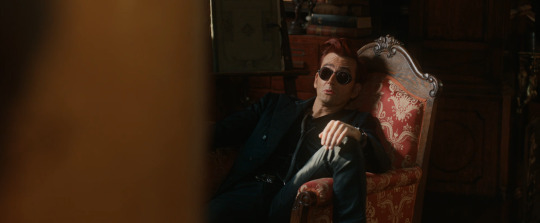
And, of course, nearly every time we see him enter the Bookshop to engage with Aziraphale, the glasses come off.
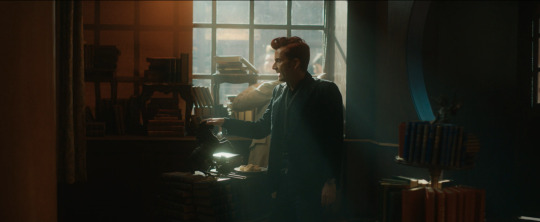
He lets his face stay exposed in the shop, even eventually in front of Gabriel. The only other place we've ever seen him take his sunglasses off by his own choice are in his own flat or when he's trying to make a point about his own nature. Even when he's engaging with Hell, so long as he's not grabbed unexpectedly, he has them on. Crowley wears them around people well before sunglasses had technically even been invented. But not here. Not anymore. Not in this story that is framing the bookshop as a literal safe haven.
Even the palette for the Bookshop this season speaks volumes. Now Season 1 in general is a little grayer than Season 2 (this is in part because of the general aesthetics of when they were made and in part because of the difference in tone between the two seasons) and it's very very noticeable in the shop itself. Here's some side by sides of similar areas of the shops between two seasons, I bet you could guess which was which based on the colors themselves.
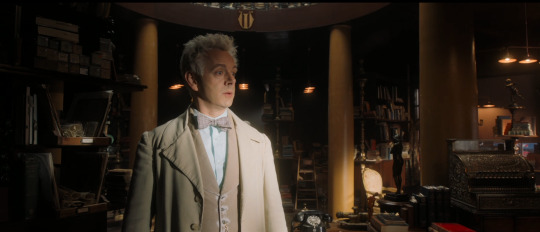

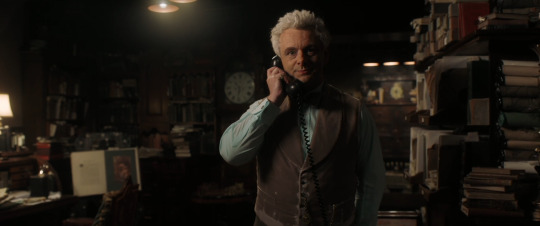

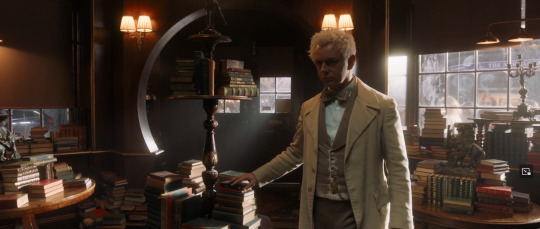

The palette season 1 suits Aziraphale just fine. It's more neutral tones like he tends to favor on himself. It's still cozy but in a dusty sort of way. The palette of season 2 is warmer. Less white and more orange to the point where even the pillars holding up the bookshop are more vibrant. There's more natural light and we see it more often during the day. It's a warm, shared, space now. They both get plenty of use out of it.
And Crowley now looks like he fits there too. The shift in his palette makes him feel in conversation with the bookshop in a way his season 1 red can't quite mesh with the more washed out palette. I won't repost all these images I was going feral over last night but you can find a lot of shots of him in the shop windows here that really show the ways he works with the colors of the shop.
So why hasn't Crowley moved in officially if he's practically done so already?
Because this is their whole problem in a nutshell. It's a prime example of the way their pattern doesn't work anymore. It's not built for a world like this. Its built for a world where they have to hide and make excuses. And while being free of that is objectively good it also means they have none of that to hide behind anymore. Subtext doesn't have to be subtext anymore and that can be as scary as it can be exciting. Freedom from things like Heaven and Hell can be hard when that's all you've ever known. This is all new territory for them. The meaning of what home can be to them shifts a lot in a space where they can more or less do as they like.
Aziraphale doesn't need to be indirect about what he wants anymore but can't quite figure out how to be more direct in the asking. He's ready but can't quite parse how to say that out loud. Or why he would even need to when he's been saying it quietly for more than a century. He built a shop full of human knowledge into a safe haven for the demon that fell for asking questions. He invited Crowley into the shop on day one, just like everything else he loves. He's already left the door open for Crowley to come and go as he pleases and as far as he's concerned Crowley has already half moved in anyway. From his perspective he's already set a large blinking neon sign up that says 'this is your home too'.
Crowley, for his part, can't read this cue. Not without thinking about going to fast or starting a battle with his own sense of self worth. He's been in keep them alive mode for so long I'm not even sure he really knows how to let himself have needs outside of that on any conscious sort of level. There's nowhere to push if you don't have an endgame. And even if he did have one the last explicit boundary he had established by Aziraphale was telling him to slow down.
But I do think they both realize this. Crowley grumbles about what's the point from the start of his first scene and of course eventually does take a shot at expressing his wants. Aziraphale's fixation on the Ball comes into play here too. He says they allow humans to realize they have misunderstood each other and that they're actually in love. Which is just flat out their whole problem summarized for us nice and neatly.

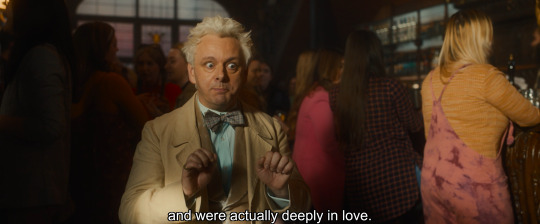
They're not understanding each other. They haven't had the conversations they need to have. But they are trying. They still trying, even if they don't understand the ways each other is doing so. And at the end of this season even as they are separated again, the nest still stands. And, maybe the next time we get to see them, they'll decide it's in good hands right now and start building another nest together in in South Downs, but, no matter what, the shop is still home. And even if it is a place they have lost each other twice, there is no doubt in my mind that it is a place they will find each other again.
#good omens#gos2 spoilers#good omens spoilers#good omens season 2#good omens meta#the Bookshop#az fell and co#aziraphale#crowley
1K notes
·
View notes
Text
Ok so I listened to SHOS pts 1 and 2 and I just have thoughts about the whole meta around mentioning Moriarty.
Because the podcast plays John and Sherlock as real. As if all of this is actually happening now in our world. It puts any listener with even a passing knowledge of Canon in the very intense position of knowing what's going to happen in a broad sense. We can see how John and Sherlock are doomed by the narrative.
We hold our breath as Sherlock talks about bodies of water though especially waterfalls.
We wonder how John will feel in the future about singing "don't go chasing waterfalls"
We scream as we hear James Moriarty get a shoutout.
But we can't warn either of them what lies ahead. If we try, they won't see it. It will be ignored or dismissed. There's also a sense that we cannot cross that line because it would also change the narrative and we can't because it's already literally been written.
Every listener has been forced into the role of Cassandra with this podcast and it is fascinating.
#sherlock & co#sherlock and co#sherlock holmes#john watson#james moriarty#meta#thoughts and musings#its soooo interesting playing this as real but still maintaining that thin veneer of a 4th wall
332 notes
·
View notes
Text
oh my gods the part in episode 9 where sherlock is hardcore masking for watson's mum and watson is surprised at how socially adept he's being only for him to fall into a chair and sigh and say "goodness that was exhausting" IM SCREAMING you have no idea how much this little, tiny bit of autistic representation means, and its so normalized, watson saying "yeah i bet it was" HE UNDERSTANDS i feel so seen
#sherlock & co#sherlock and co#sherlock & co spoilers#sherlock and co spoilers#sherlock#sherlock and co meta
854 notes
·
View notes
Note
I wish everyone collectively understood aventurine’s character like you…things would be so much easier! I genuinely don’t understand how people keep getting his motivations wrong??? Could it be because some of the most popular Aven fanfics were written prior to his release? That could have contributed to some of the takes we tend to see about him…thoughts?
I struggled all day to come up with a concise way to answer this and couldn't think of one, so here, have a long-winded ramble:
I don't think early fic writers have much impact in the situation with Aventurine's character now, since most people can look at when a story was posted and go "Oh, this was before we had ____ information."
I think that Aventurine's problem is being a male character in a gacha game. Gacha game characters are designed to sell. Hoyo can sell female characters very, very easily. Give her huge tits and a visible underwear strap and you're good to go. I love all my guy friends, but I'm not gonna sugarcoat it: straight men are not the hardest audience to please. Hit a particular fetish (feet, spandex, dommy mommy), and you're gucci.
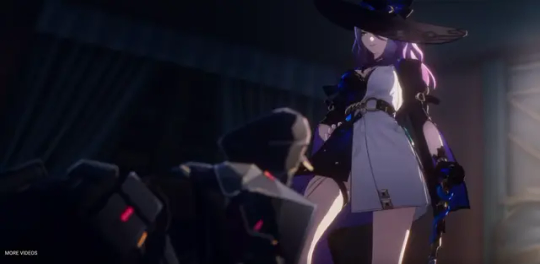
Nah, we all know why Jade's trailer is Like That.™
Male characters in gacha are harder to sell because women as consumers are a little harder to predict. Does every woman want a tall, ripped hunk? Shit, no, small cute boyish models like Aventurine are selling better now? Why?! Would a bad boy be more popular than a nice guy??? It's harder to account for women's tastes, especially because they are often (a little) less visually-oriented.
Hoyo is good at what they do though, and they've figured out that male characters sell very well when they possess at least one of two specific traits:
Endearing vulnerability/helplessness
Gay ship tease
Give a character both, like Aventurine? They might as well be printing money.
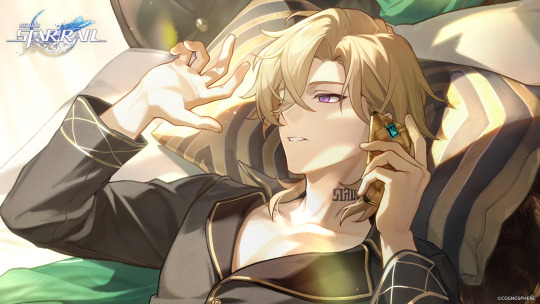
That sound you hear is Hoyo's stock prices rising.
So, from the very beginning, Hoyo is incentivized to create a character that appeals to people, a character people will want to crack their wallets open for. And they achieved this, first and foremost, by giving Aventurine traits that female players (in particular, but men too), find especially appealing: emotional and physical vulnerability.
We see Aventurine's pain. We sympathize with his grief. We identify with his struggle to make meaning of his difficult life. He's our woobie, blorbo, babygirl, whatever the hell they're calling it now.
He can't hide his suffering anymore. He's on the very edge. He's a dude in distress. He's surrounded by enemies! He misses his mama! He's been betrayed! No one understands him like you do, dear player!
The ultimate feeling evoked is: He needs to be saved.

When people talk about male power fantasies, I think they forget that women can experience them too, and "Emotionally vulnerable man that only I (or my favorite character) can fix" is actually a female power fantasy.
And from there it's really easy, right: the people who shell out cash to buy warps for their harmed-husbando feel like they've saved him; the people who are into mlm ships look for the nearest hot dude to be the savior Ratio was waiting for his time lol.
Morally and intellectually, this type of deep-down-golden-hearted, emotionally-wounded male character is very easy to digest. There is nothing to dislike about this type of character or role in the story: this character is a good guy who has just gone through so many terrible situations, whose victim status makes him endearing, and whose lack of agency means that any of the questionable or downright bad things he does are always the result of someone else forcing his hand, and never something he would have chosen himself.
His motivations are always clear and consistent: get free, heal, and live happily ever after.

Insert the Wreck-It Ralph meme: "Do people assume all your problems got solved when a big strong man showed up?" But to be fair, a big strong man did kind of solve Aventurine's problem, so--
Anyway, it's simple. It's straightforward. Morally, it's pretty cut and dry, black and white: Aventurine is our hero, which means everyone dictating the course of his miserable life is evil.
Hoyo is not remotely discouraging people from literally buying into this emotional appeal.
And trust me, I get it. I'll be the first to admit that hurt-comfort is its own entire genre in fandom because it is so appealing. People eat up Aventurine's tragic backstory like candy! The idea of watching a character go through hell at the hands of bad guys just to finally find a happy end is like the definition of everyone's favorite story.
In fact... people love Aventurine's suffering so much, they have invented whole new ways for him to suffer that aren't even in the game.
This is where we get all the headcanons that Aventurine was a sex slave, every single person he meets hates him because of his race, the Stonehearts are executioners holding knives to his throat, Jade enslaved him to the IPC with a lifelong contract, his material possessions belong to the company, the IPC is forcing him to take only the most dangerous missions where he is being required by his evil jailers to continually put his life on the line... You name it and I promise you, I can find a fanfic where Aventurine suffers from it. 😂

Bro can't even sleep in on his day off; life is so hard for this man.
Being serious: if the game is telling us that Aventurine is a victim... Why not make him the perfect victim?
Why not envision an Aventurine with no freedom, who bears no responsibility for any of the horrible situations he is in or any of the dubious things he does?
It's so natural to like that version of Aventurine, so appealing to see a totally powerless underdog use his own wits and charms to claw his way up to freedom. Or, if you're the kind who really relishes angst: It's even appealing to see Aventurine lose more. To delight in fics where he loses his wealth, where the IPC punishes him for past crimes while he's powerless to stop them... (I assure you, this is many people's cup of tea and the fanfics prove it!)
Ultimately, there's nothing wrong with liking characters who are exactly this straightforward! It's completely fine to embrace characters that are intentionally written to be morally above-board, whose primary role in the story is to generate angst by being a good person who suffers, or those characters who never show unlikable traits, bad decisions, or contradictory actions.
The problem is that that's just not who the game is telling us Aventurine is.

Hoyo may be capitalizing off people who love to envision poor Aventurine still living his life as a slave... But the game also needs to tell a complicated enough story overall to appeal to people who don't care about this specific husbando--Aventurine's role in the actual game's plot has to be interesting enough for almost everyone to appreciate it, not just Aventurine's simp squad. (Don't get mad, I'm in the simp squad with you.)
So his character doesn't stop at just being a pure-hearted victim who is still waiting to be saved.
Aventurine is not that easy to label, and I think the biggest struggle in this character's fandom right now is between people who prefer the even-more-angsty, still-a-slave Aventurine versus people who want a morally grey, self-destructive character instead.
To me personally, while I greatly understand the appeal of fanon!Aventurine and the joy of a really juicy angst fic where characters lose it all, I think that missing out on the depth that canon is suggesting would be a real loss on the fandom's part.
The character motivations that Aventurine shows in the game are complicated. They cancel each other out. They're basically self-harm! He makes almost every situation he's in worse for himself--on purpose.
He is a good person, but also a person who has done unspeakable things. He does have morals, but he's not above allowing those who don't have them to use him to their advantage.
He's both the victim and the victor. He's his own worst enemy. He's a lost little boy who's been making terrible decisions for himself since he was like eight years old, and a grown ass man who is barely managing to fake his way through an existence that destiny is not letting him quit.

This kind of character is a lot harder to embrace. He's done things that most people would find appalling--like willingly joining up with the organization that let his entire race be massacred. He's invented a whole new peacock persona to frivolously flaunt riches he doesn't even care about (Poison Dart Frog Self-Defense 101). He actively plays into racist stereotypes about his people to manipulate others through their preconceived expectations. He's made a mockery of his mother's and sister's hopes and dreams by endlessly trying to throw his own life away.
He has flaws! He bet everything he had on a ploy without doing his homework to find out if the people he was risking his life for were even still around. (Maybe he already knew, and couldn't bear to admit it, even to himself.) He's intentionally off-putting and obnoxious to everyone he meets (Poison Dart Frog Self-Defense 102). He terrifies everyone who gets close to him by (seemingly) carelessly throwing himself into the jaws of death without the slightest provocation.
He knowingly allows the IPC to exploit his power and talents for profit. Did everyone forget that his role in the Strategic Investment Department is asset liquidation?! Like, his actual day-to-day job is ruining people's lives. Canonically, Aventurine kills people when his deals go bad.

His motivations change off-screen in two lines of story text. We're told in one line that his biggest reason for joining the IPC was to make money to save the Avgin, then in the next line we find out that's impossible. And... then what? What motivations does he even have now? The whole point of his character arc from 2.0-2.1 is that he was on the edge of giving in to utter despair and nihilism because he couldn't even perceive a single reason to stay alive. He has no purpose in life before Penacony, and that didn't start with the Stonehearts at all??
People keep saying Aventurine was held in the IPC by golden handcuffs, but how do you tie down someone for whom profit is meaningless? What can you offer to a man whose only desire is to bring back something already lost forever? How do you imprison someone whose only definition of freedom is, canonically, death?

Working for the Stonehearts is obviously not healthy. But that's why Aventurine was doing it--because taking dangerous missions allowed him to put himself at risk. The job that he originally pursued hoping to save his people became a direct means to self-harm, and the IPC's only real role in that was just happily profiting off the results.
The journal entries for Aventurine's quests are there deliberately to tell the player what is on his mind, and none of it has to do with escaping from his job:

Like... Work is the least of this man's problems.
At really the risk of rambling on too long now, he's also just a massive walking contradiction:
Aventurine is among the most explicitly religious characters in the game, yet he's one of the only people in the entire game that we have ever seen actively question his people's aeon.
You might be tempted to think Aventurine's risky gambles with his life as an adult are a result of giving up after finding out about the Avgin massacre... Butttt no, Hoyo makes sure to tell us that even at knee-high in the Sigonian desert, Kakavasha was already willing to risk himself in a fight to the death against monsters because even back then he found his own life to have less value than a single memento.
He's the "chosen one" who will lead his people to prosperity... except they're all dead.
He's explicitly suicidal... andddd also a pathstrider of Preservation.
He wants to die... He doesn't want to die. He wants to make it end, yet goes to staggering lengths to continually survive. (Every plan risks his life on purpose--but every plan's win condition is also to live.) He life is the chip tossed down, but his hand is trembling beneath the table. When faced with an otherwise unsurvivable situation, Aventurine literally became a winner of the Hunger Games. He beat other innocent people to death with his own chain-bound hands just to come out alive.

He knows the IPC failed the Avgin and left them to die... and he still willingly sought out a position of power in their organization. Maybe he really is after revenge... but maybe not.
He starts his journey in the IPC with a truly noble goal in mind: to help his people using his newfound wealth and power. He's a good guy who did genuinely want to save the Avgin and repay all those who helped him. But once it became clear he was too late, once it was obvious he would have no use at all for that monetary wealth and power he risked his life to get... What did he do with it? Unlike Jade, we don't see him over here donating to orphanages. (I'm not that heartless; I'm sure he does actually do a lot of good things with his money on the side, but the point is that the game does not show us that--it shows us, over and over again, Aventurine putting on a wasteful, over-indulgent persona toward wealth. We've supposed to feel how meaningless money is to him, how meaningless everything is becoming to him.)
He outright refuses to use underhanded tactics or to cheat at gambles, which is meant to show us that's he's more morally upright than his coworkers. There's an entire exchange where he says that he'll never stoop to using manipulation the way Opal does. But... he doesn't have any issue fulfilling Opal's exact agenda. He was never remotely morally conflicted about denying the Penaconians their freedom by dragging Penacony back under IPC control.

He's willing to risk his own life, which is one thing--but he's also willing to risk other people's well-being. Topaz accuses him of constantly egging their clients on into dangerous situations; we've actively seen him shove a gun into Ratio's hands and pull the trigger with no care for how Ratio would feel about that on their very first meeting... Dragging the Astral Express crew into the entire Penacony plan in the first place was exceedingly dangerous...
To me, I just think it's vital to understand his character through the lens of these contradictions because they demonstrate the extreme polarity of Aventurine's life: from rags to riches, from powerless to empowered by multiple aeons, from willing to kill to survive to killing himself... He has quite literally lived a life of "all or nothing," and while he is the victim of many terrible situations out of his control, his arc as a character involves facing the truth of himself and the future his own actions are hurtling him toward.

Frankly, the Aventurine that canon is suggesting is a little annoying. You want to grab him by the shoulders, shake him, and say "Why are you like this?!" And he won't even have an answer for you, because he doesn't even know why he's still alive.
In the end, to me, this is so, so much more interesting. I can read an endless supply of hurt-comfort fics where Aventurine escapes the evil IPC and Ratio is there to fill the void in his life with the power of love and catcakes and be a perfectly happy clam online, but I want canon to continue to serve us this incredible mess of a man who constantly takes one step forward and two steps back.
Who is fully aware of his role as a cog in the grotesque profit-wheel of cosmic capitalism and still manages to say he never changed from the rags-wearing desert rat of the Sigonian wastes.
Who over and over again flirts with nihility but, ultimately, even if he has to wrest it from the grip of the gods themselves with bloody, chain-bound hands, chooses life.

#honkai star rail#aventurine#aventurine meta#hsr meta#character analysis#listen I see you angsty fic writers who bully our favorite for maximum emotional gain#I am a ratiorine fan with the best of them#so I fully understand the appeal of the “I can fix him” fic#but like#there is so much else just waiting in the text of the game#that makes Aventurine such a rich complex and nuanced character#admitting that the IPC is the least of his issues makes him MORE interesting#not less#I promise#also like#getting so tired of reductive reads of my posts#just because I don't think Aventurine is a slave of the IPC#doesn't mean I think the IPC are good people#I'm not sure how many times I can say#'They're evil and are actively exploiting him for profit'#before people will stop saying I'm an IPC apologist lollll#I promise it is possible for Aventurine to have agency AND for the IPC to still be evil#those two statements can co-exist
190 notes
·
View notes
Note
What's your opinion on Canon Ravenloft's stance of 'Darklords are incapable of redemption or positive growth?' I have a hard time believing that the Dark Powers wouldn't have snatched at least a few Darklords who learned from their mistakes.
i never liked the idea that the darklord's are never capable of redemption, not just from a pure narrative perspective but also from a DM perspective. there are players who will TRY to redeem the BBEG and i think negating that chance entirely removes that freedom and agency from players. setting up a redemption arc may drastically change the tone of the campaign (going from kill the baddy to rehabilitating this one weird person) but if that's the campaign player's want that's the one they can have bc at the end of the day it's about fun. besides, setting up a curse that can't be cured (since strahd can't actually die he always comes back) is very frustrating for players. it can also offer unique opportunities for moral dilemmas and player reflection, like why is it assumed the only option is to kill?
current canon is weird anyway especially since old 2e-4e ravenloft gazetteers also outlined how the dark powers might try to give the darklord's one last chance on reflecting upon their mistake and an original gazetteer writer said that redemption was always an underlying theme of ravenloft in his understanding
i think it also depends on how you characterize the dark powers which is smth that 5e has failed at imo. for my campaign i try to take more of an eldritch/bloodborne vibe for my dark powers since that's what 2e supported and i liked that better than old vistages with names and faces. it makes it more spooky in my opinion, but with that in mind the purpose of the dark powers in my campaign is just to feed off of suffering so they don't want the darklords to redeem themselves because it means suffering. however, it means redemption is still possible and a way to break the curse
tl;dr yeah i think it's dumb and uninteresting but that's just my opinion and i know some og ravenloft fans feel the same way and @casketsanctum has made a post about redemption in ravenloft as well 😌
#dnd#curse of strahd#ravenloft#i burnt my risotto bc i was writing this :(((#ravenloft meta#cos meta
21 notes
·
View notes
Text
Sean is really the Candela character of all time because of how fundamentally entangled he is within not only the world but the literal mechanics of the game. He is entrenched in the cycle of violence and he has no capacity to see any escape.
And how could he? Why would he care in the end about monsters living among them, wearing human faces? There's nothing anymore monstrous about the shapeshifters than the men in that room—himself included. The only difference Sean sees between his doppelganger and those men is that the doppelganger is going to give him what he wants.
In fact, this is also the only difference he sees between himself and those men. He doesn't kill them because they did something monstrous. He kills them because in his estimation, with all of them as evidence of this belief, the only things you get in this world are the things you take for yourself. Their deaths won't bring back his brothers, or erase the things he himself did, or even really further his efforts to rescue his mother. He kills them because he wants to—if the world is inherently violent, and it is on a fundamental level, then he's going to take what he wants.
Because the violence of the world is baked into the fabric of reality, both narratively, through the Flare, which can never be defeated, only struggled against, and mechanically, through the significant odds of failure or complication. There is so little success in the world of not only Newfaire but Candela Obscura itself.
It has nothing to do with who is the biggest baddest monster. Sean's approach to violence and later betrayal is beyond the consideration of morality, because the struggles of Candela Obscura leave so little room to split hairs over morals. Survival is at stake. The organization of Candela Obscura is misguided and ineffectual not because of any inherent problems of the organization or corruption of its members, but because they are, in Sean's mind, always only making losing bets.
In Newfaire, the dice are loaded, the house is all-powerful, and humanity is the underdog. Was it any surprise that Sean Finnerty got tired of losing?
#candela obscura#co spoilers#cr meta#sean finnerty#in all ways but physical I am chewing glass oh my fucking god#I have like seven posts to write I'm so feral over this show
412 notes
·
View notes
Text
Glad to see that Tim being a giant Dick Grayson fanboy is finally being highlighted again, and sparking more discussion especially on their early relationship! (Please gimme more!!! I love them so much, augh!)
Probably as a result of that surge, there seems to be reciprocal chatter on the topic of how young Tim actually felt towards Jason, too. It's honestly pretty interesting, because it's more nuanced than it appears at first glance.
Which means it's very fun to dissect! ✨
There's a degree of subjectivity to keep in mind, because readers are going to have different interpretations of the same scenes, or will pull from entirely different scenes than one another to form their individual view on this topic. That's just how it is in comic book fandom, for many things! Regardless, in this case... if the scale ranges from the extreme of "Jason was Tim's Robin" to the other extreme of "Tim actually hated Jason [as Robin] or thought he was a loser that got himself killed" — the actual truth is closer to the middle, as is often the case.
At least, in my opinion.
Mainly I want to focus on those relatively early days with this post, to highlight Tim's initial(-ish) feelings towards his heroes, and touch on the point at which they really begin to change. This turned into a very long post, though. Brevity is beyond my skill, so grab snacks and water lol. Transcripts for each image will be posted at the very end under the cut.
So, the two storylines I want to cover are "Rite of Passage," which is rolls into "Identity Crisis." (NOT to be confused with the major crossover event "Identity Crisis™" which came years later, and is where Jack Drake dies.... But it sure is an interesting coincidence that Tim deals with the loss of each parent in two similarly named stories!) These take place before Tim is even Robin, and I'll be considering them as one arc for this post.
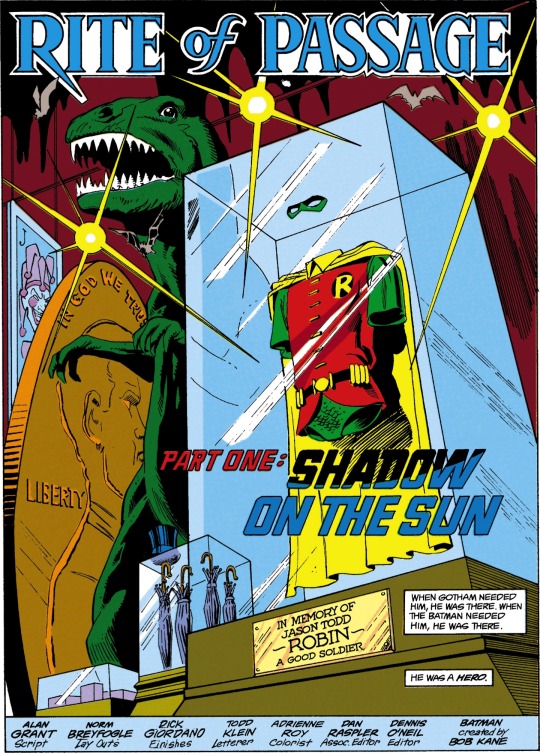
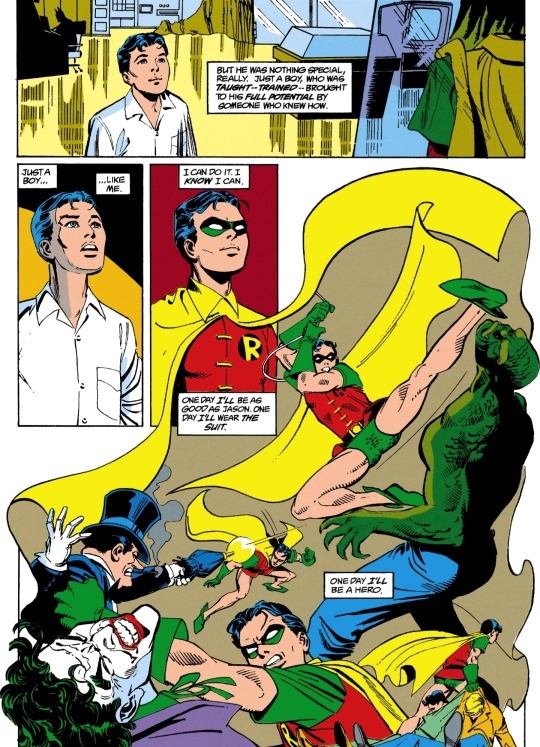
Detective Comics vol. 1 #618 (July, 1990) -- Pages 1 & 2
"When Gotham needed him, he was there. When the Batman needed him, he was there. He was a hero."
"One day, I'll be as good as Jason. One day I'll wear the suit."
To start off, we have this opening from "Rite of Passage." Tim is still in training here, mainly helping Bruce with minor stuff from the cave. His parents are off traveling, alive and well as of these next few pages. He's still bright-eyed and full of wonder. An extraordinarily weird but ultimately innocent kid.
So his view on Jason is positive and fairly simple: a hero, and someone to look up to as Robin. Clearly, Tim here doesn't think Jason was deficient in his role, either as a protector of Gotham or as Batman's trusted partner.
Moreover, Tim already held Dick in very high regard because he was amazingly skilled before he became Robin. To Tim, that's not something he'll ever be able to achieve. Meanwhile, Jason wasn't like that. He was a regular kid without crazy acrobatic training since practically birth. Yet he still went on to be a hero—which is obviously motivational for Tim who finds himself in similar shoes.
It's true that Tim only ever knew or thought of Jason as Robin, and idolized him in that regard. But that's kind of all that mattered to him at that point, because he was this kid who was utterly star-struck by his heroes. Even if he's technically aware of their shortcomings as people, it's overshadowed by the hero-worship.
It was kind of the same with Bruce as Batman at first. (Which was still enough for Tim to risk life and limb to help his beloved hero, before Bruce even knew his name.) Dick was the only one Tim had any sort of "personal" relationship with beforehand, so there is an extra level of attachment—and hence why it was the nidus for his obsession with Batman. Yet even then, it wasn't like he actually knew anything about Dick as a person until later. Until then, Tim's ideas of him were all he had, too. With Jason, Tim just didn't get to know him at any point before his return (oof), apart from what he heard over the years secondhand (also oof).
Ultimately, it's the loss of innocence—along with the ricocheting bullet that is the unresolved guilt of those around him—that begins to change Tim's perception. Not just of Jason, but of things in general.
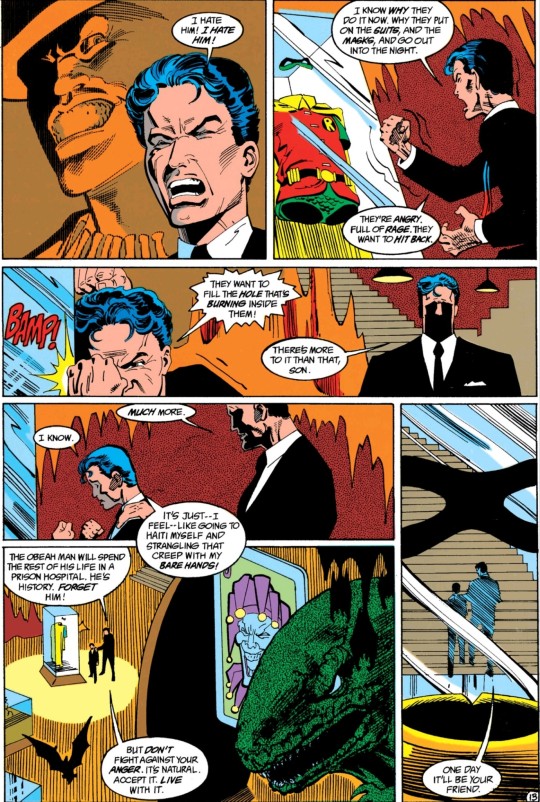
Batman vol. 1 #455 (Oct., 1990) -- Page 13
"I know why they do it now. Why they put on the suits, and the masks, and go out into the night. They're angry, they're full of rage. They want to hit back."
Losing his mother was a major shift for Tim, obviously. This is right after the previous storyline, and Tim's had the worst week or two of his life (so far). His monologue here is a reference to what happened to both Dick and Jason. The unbearable pain of loss, the rage masking the grief underneath. And importantly, that he feels both of them were justified in their anger. (And Bruce too, indirectly.)
The major theme of the aptly named "Identity Crisis" is to mirror aspects of Dick and Jason and Tim's lives—to show how they converged onto the same tragic road. It's something that Tim notices early in the story, and was frightened by. Now, horrifically, it's become a part of him as well. His parents are gone, and he was entirely helpless to do anything about it. Dick was the same way, Jason was the same way. The cycle is repeated.
In particular, the part about him wanting to go to Haiti for revenge—for his mother—sort of struck me as being an intentional parallel to Jason and Ethiopia. It's a bit of a stretch, especially in isolation, so others may see it differently (e.g. the angry ramblings of a grieving child that does sound like something anyone might say). But it always stuck out to me because of how much Tim is compared directly to Jason in this arc. More on that below.
It's not something I can really give an accurate feel of because it's a lot of subtle things that begin to add up, so I'd encourage folks to read this arc themselves to see what I mean. (Or maybe you'll still disagree which is fine too lol.) Again, many things are in reference to both Dick and Jason in relation to Tim, but it's weighted more on Jason's side.

Batman vol. 1 #455 (Oct., 1990) -- Page 18
"You think my anger will boil over, the way Jason's did. I can assure you, it won't!"
Tim's grief has begun to pull away the veil of idealism that enshrouded his heroes in his mind. It doesn't apply only to Jason, but to the rest of them. Plus add the fact that Tim's keenly aware that he's being managed, even if the adults around him are careful to not outright say certain things. He still knows.
Bruce, Dick, and Alfred are all worried about Tim potentially turning into "another Jason." They (and mainly Bruce) caution Tim to not ignore his emotions, but they're still concerned that he may be overly eager to prove himself in order to cope, and could get hurt or killed as a result. While they aren't wrong for their caution—especially at how unsettlingly similar all the circumstances are—they aren't very subtle about the elephant in the room.
Imagine how that would affect Tim's perception of his predecessor, especially when he's in the midst of a traumatic event he hasn't had time to fully process. The negative association is pretty much inevitable.
Tim's known from day one that he's walking in Jason's shadow, and now it's become inescapable. Tim went from seeing Jason as a goal to reach, to feeling that unless he surpasses him, he wasn't going to be taken seriously by anyone. However, as of this arc, Tim doesn't even fully come to that point yet.

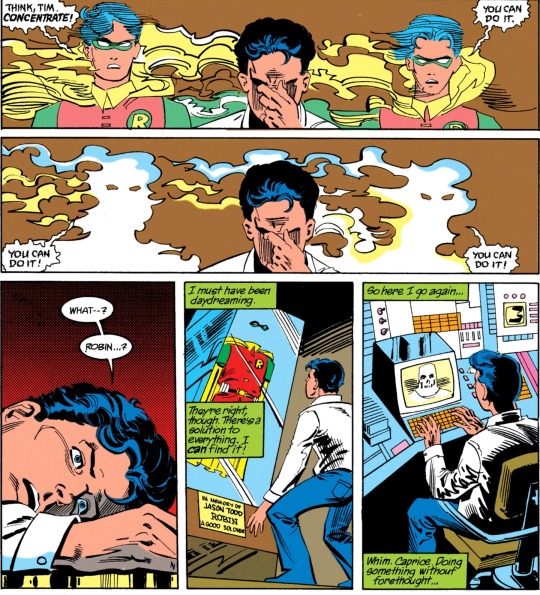
Batman vol. 1 #456 (Nov., 1990) -- Pages 14 & 15
"Drop-outs don't make it. And dead heroes are no use to anyone!"
It's really easy to take away "Tim totally thought Jason got himself killed" as the main thing here, but I think that's missing the forest for the trees.
First some context: Bruce has gone out on a mission to get Scarecrow, and expressly forbade Tim from doing any shenanigans. Meanwhile, Tim is grappling with wanting to prove himself and trying to help Bruce from the cave, all while trying to deal with his emotions. At some point, he falls asleep and ends up having like... exhaustion-grief hallucinations of Dick!Robin and Jason!Robin who confusingly caution yet encourage him. The main theme of this part is facing your fears.
Depending on how you want to interpret the intent of Jason's dialogue here, you could go several ways with it. Ranging from "writer's feelings towards Jason" to "a peek into Tim's mind as his fears manifest as visions of his heroes" or some mixture thereof.
Though Tim argues with Bruce that Batman needs a Robin, we're shown that Tim is understandably scared of joining Batman's "war." He's still not willing to let Bruce go it alone, though, and that's something he feels more strongly than his fear.
Meanwhile, hallucination!Jason's warnings are a lamentation of what happened to him in a way, but it actually exactly describes Tim's current situation even more so. Unlike Jason, Tim is under-trained, under-experienced, doesn't even have a suit of his own yet. But like Jason, he can't sit by and do nothing while someone he cares about is in danger. Tim knows that if he goes out there, he will probably get himself killed, and it will be his own fault. So he's about to disobey Batman's orders, and fly right into danger. If that got Jason killed, then Tim—who is in a way worse position experience-wise—has every chance of ending up the same.
Like... it's about Jason, but it's also about Tim. It's Tim's worst fears made manifest, via the representation of why he is even here in the first place (Jason's death).
That's my theory anyway, but perhaps this is an overly charitable reading of this scene on my end. (Not that I think that makes me wrong lol.) However given that Grant wrote both parts of this arc, and the beginning of which is especially favorable towards Jason, it certainly is something to ponder. I have a lot of thoughts on it I can't expand on here tbh but perhaps that'll be another post.
Anyway, returning to the point of the similarities vs differences between Tim and Jason: since this is the arc that solidified Tim as the next Robin in comic continuity, it makes sense that the writers really pushed the comparisons between the two of them, specifically. (Even though Dick was pretty similar, as going against Batman's orders is the Robin thing to do, it's not his shoes Tim is directly filling.) So making Tim's "debut" story arc mirror Jason's "swansong" is an obvious narrative choice.
To drive home the parallels, I wanted to include this panel from just a few pages prior to the "daydream":
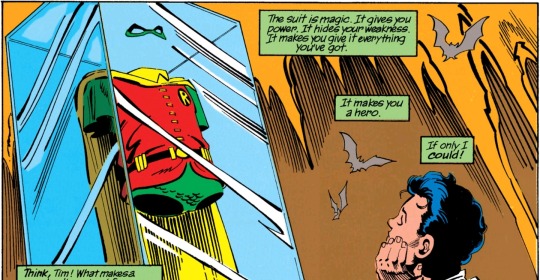
Batman vol. 1 #456 (Nov., 1990) -- Page 9
"The suit is magic."
That so distressingly close to Jason's famous "being Robin gives me magic" line (Batman #385, page 6). Given all the previous context, it's hard for me to just dismiss it as pure coincidence. Even if it is, the point still stands. Tim is shown having the some of the same heartbreakingly naive views as Jason once did, right in front of Jason's memorial, just as he's about to go and run off into the night against orders.
I think that speaks for itself. There's a lot to take away from it, if you so choose. Especially given the context of that specific Jason arc.
Alright, back to the main course:
So in the end, Tim actually goes out in civvies and a ski mask because if he fails, then at least he wouldn't bring shame to Robin's legacy™. When he gets fear gassed saving Batman, it's once again both Dick and Jason that he hallucinates encouraging him to push past his fear. (Shout out to the fact that he's literally more afraid of tarnishing the legacy of Batman & Robin than he is of dying.... I'm sure this will not be a recurring thing for him in the future.)
Tim's ideology is shown to be similar to Jason's, and the actions Tim ultimately takes are similar to Jason's... but the outcome is different. And it really isn't just "Tim succeeded where Jason failed." At least, that's not what I took away from this. Rather, Tim had no reason to succeed any more than he had to fail, just that he did. Luck combined with caution because he knew what happened to his predecessor, and the fact that Batman was there to finish the job all made the difference.
You could say (and I know some will) that it's just classic Jason character assassination and the writers trying to implore readers that this new kid is different we promise pls don't hate us look how much better he is! But in this case, that feels like it undermines the whole point of this story. It doesn't fit with what the characters actually say.
Thus, we return to the question of how Tim felt towards his predecessor. And the answer is different from where we started, because Tim is different. Not that different though. Because even though at this point Tim—like all the adults around him—has probably attributed Jason "going off on his own" being what led to his death, Tim still thought of him as a hero to look up to. It's about Robin, first and foremost, yes. But Tim is fully aware of the people who made that suit mean what it does, because it's all intertwined.
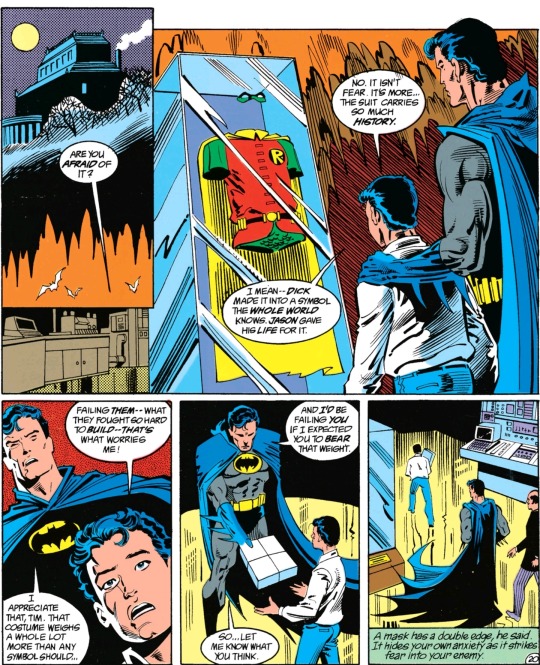
Batman vol. 1 #457 (Dec., 1990) -- Page 20
"I mean--Dick made it into a symbol the whole world knows. Jason gave his life for it."
Even further, Tim thinks of it in terms of Jason having given his life for what he believed in, for the legacy that now falls to Tim. There's a sense of gravitas there. He's afraid of failing both the Robins who came before him.
Ultimately do I think Tim adored and loved Jason on the same level as Dick or something? No. It's not comparable. (Dick was like part of some of Tim's earliest memories and everything! They have a really unique bond ok.) Yet Tim was also far from thinking poorly of Jason so early on. Frankly, it seems that Tim thought of Jason as a noble hero and a cautionary tale. Yes he took risks and sometimes went too far, generally stuff that Tim doesn't want to repeat and all that. At the same time, Tim still saw him as someone whose legacy and memory was worth honoring.
It's complicated, which is why I like it so much—because it feels real. Having conflicting feelings towards someone is... so human. Especially someone you never got to know, yet who plays such an integral role in your life via the shadow of their death. How can you feel anything but complicated towards them?
It has to be said that, yes, Tim's views—even before Jason's return—change over the years. He becomes more jaded as a person and is surrounded by people who are even more jaded than him... and who often mention Jason as the "failed Robin." It's something that's hung over Tim's head all the damn time. The curse of the Robin mantle.
So it shouldn't come as a surprise that Tim's idea of him becomes more akin to "sounds like a skill issue" as the years go by. All bets are off after Jason's return, and the Titans Tower Incident™. At that point it's firmly "I am better than you, loser" lmao.
And... that's all without getting too into things like authorial intent and general "moods" of different DC writers towards Jason at a given point. Or retcons that played a role in his characterization and how other characters talk about him, depending on what "era" you're reading. That's way beyond the scope of this post though!
TLDR; even though young Tim Drake was obsessed with Dick Grayson as Robin, he still looked up to Jason Todd as well. He didn't think of Jason as a cringefail loser until later. :)
(image dialogue transcripts under cut ↓)
Dialogue Transcript for Image 1 (Detective Comics vol. 1 #618 -- Page 1):
Narration box (Tim): When Gotham needed him, he was there. When the Batman needed him, he was there. He was a hero.
Dialogue Transcript for Image 2 (Detective Comics vol. 1 #618 -- Page 2):
(Scene continued from previous page)
Narration box: But he was nothing special, really. Just a boy, who was taught--trained--brought to his full potential by someone who knew how. Just a boy... like me. I know I can do it. I know I can. One day I'll be as good as Jason. One day I'll wear the suit. One day I'll be a hero.
Dialogue Transcript for Image 3 (Batman vol. 1 #455 -- Page 13):
Tim: I hate him! I hate him! I know why they do it now. Why they put on the suits, and the masks, and go out into the night. They're angry. Full of rage. They want to hit back. They want to fill the hole that's burning inside them.
Bruce: There's more to it than that, son. Much more.
Tim: I know. It's just--I feel--like going to Haiti myself and strangling that creep with my bare hands!
Bruce: The Obeah Man will spend the rest of his life in a prison hospital. He's history. Forget him! But don't fight against your anger. It's natural. Accept it. Live with it. One day it'll be your friend.
Dialogue Transcript for Image 4 (Batman vol. 1 #455 -- Panels from page 18):
Tim: Because you think my mother's death has upset me too much. Well, it did. But I've taken your words to heart. I can cope. You think my anger will boil over, the way Jason's did. I can assure you, it won't. But that doesn't make any difference, does it? Why can't you have a little faith in me?
Dialogue Transcript for Image 5 (Batman vol. 1 #456 -- Page 14):
Narration box (Tim): Blast it! My head's starting to swim. I'm about ready to give up. I almost wish I'd never heard of Batman and Robin!
Vision Dick: Heroes never give up, Tim.
Vision Jason: You know that.
Tim: Dick--! Jason Todd!
Vision Dick: You're training to fight in a war, Tim. It'll last all your life. No matter what, you have to go on fighting.
Vision Jason: Drop-outs don't make it. And dead heroes are no use to anyone! I thought I knew better than Batman. I thought I could run before I could walk. I killed myself, Tim. Because I couldn't wait. Because I couldn't think it through.
Dialogue Transcript for Image 6 (Batman vol. 1 #456 -- Page 15):
(Scene continued from previous page)
Vision Dick: Think, Tim. Concentrate!
Vision Jason: You can do it.
Both: You can do it!
Tim, waking up: What--? Robin...?
Narration box (Tim): I must have been daydreaming. They're right, though. There's a solution to everything. I can find it! So here I go again... Whim. Caprice. Doing something without forethought.
Dialogue Transcript for Image 7 (Batman vol. 1 #456 -- Panel from page 9):
Narration box (Tim): The suit is magic. It gives you power. It hides your weakness. It makes you give it everything you've got. It makes you a hero. If only I could!
Dialogue Transcript for Image 8 (Batman vol. 1 #457 -- Page 20):
Bruce: Are you afraid of it?
Tim: No. It isn't fear. It's more... the suit carries so much history. I mean--Dick made it into a symbol the whole world knows. Jason gave his life for it. Failing them--what they fought so hard to build--that's what worries me!
Bruce: I appreciate that, Tim. That costume weighs a whole lot more than any symbol should... and I'd be failing you if I expected you to bear that weight. So... let me know what you think.
Narration box: A mask has a double edged, he said. It hides your own anxiety as it strikes fear into your enemy.
#tim drake#jason todd#dcu#dc comcis#batfamily#meta#I'm so sorry this post got out of hand fr#it was meant to be a quick drabble with some comic panels and instead i just...... kept going#this post is specifically for my one (1) bestie who cares and the like 2 ppl who might be as insane as me about Timmy#idk why I'm like this im just obsessed with Tim's relationship with early Batfam & co lately???#late 80 and early 90s comics my beloveds......#anyway if this gets more than 5 notes i'll be shocked and scared lol#nyerus.txt#text post#long post
587 notes
·
View notes
Text
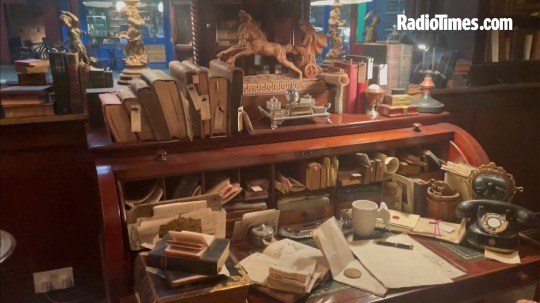
I was minding my own business and analyzing another part of the A. Z. Fell & Co. bookshop from the Radio Times footage when I noticed something interesting on Aziraphale’s desk. It looks like the angel was studying a handwritten copy of someone’s last will and testament and left in a hurry, with a bronze medal and a fountain pen on top of it. And… an attachment of a land registry plan, barely visible underneath.
Obviously that’s when my South Downs obsessed brain turned all of its alarms on and decided to read the whole thing. And look for the missing parts, since only a portion of the original document was visible on screen. Unfortunately the full text is much longer and less exciting than anticipated, and — spoiler alert — related to a different area of the country, but still relevant to the Good Omens universe. We’ll look into that in a moment.
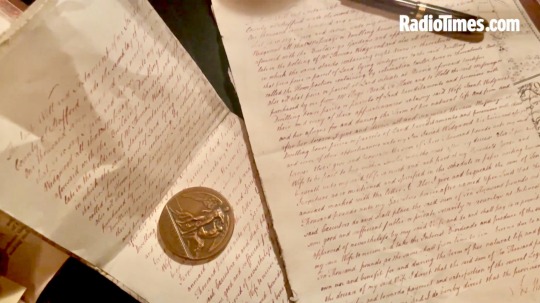
Let’s start with the struck bronze medal — acting here as a paperweight, which makes the documents in question already stand out from the usual bumph and bric-a-brac accumulated by Aziraphale over an unknown period of time on his desk.
It’s a very interesting rendition of the mythological scene centered around Daedalus fastening the wings onto his son Icarus (little does he know that this attempt to escape imprisonment will lead to his son’s demise). Contrary to popular sentiment in the history of art, this particular version of Icarus isn’t depicted as a child or teenager, but as a warrior donning a helmet and preparing himself to battle. Which makes perfect sense after discovering that it was made for the Royal Air Force Athletic & Cross Country Association’s WAAF Athletic Championships in 1945. There’s some poetic irony in the fact that the medal was apparently given to the third place winner in a high jump category.
Apart from its obviously military style, this concept seems inspired by a 1885-86 medal by Auguste Patey commemorating the experimental flights at the first French wind tunnel at Chalais-Meudon, a town on the banks of the Seine near Paris. On 9 August 1884, engineers Charles Renard and Arthur Constantin Krebs made the first controllable free flight there when they piloted their airship, La France, over a course and returned to their starting point. From 9 August 1884 to 23 September 1885, La France made seven flights and was able to return to its starting point five times.

The last Will and Testament of Josiah Wedgwood
The last Will and Testament of me, Josiah Wedgwood, of Etruria, in the County of Stafford, made the second day of November, in the year of Our Lord one thousand seven hundred and ninety-three, in manner and form following (that is to say): I give and bequeath unto my dear and affectionate Wife, Sarah Wedgwood, all that messuage or dwelling-house situate at or near Etruria aforesaid, with the buildings, gardens, and appurtenances thereto belonging, late in the holding of Mr. Thomas Wedgwood; and also all that field or piece of land in which the same stands, containing eight acres or thereabouts; and also all that close, piece, or parcel of land lying contiguous to the said dwelling-house, called the Horse Pasture, containing by estimation twelve acres or thereabouts; and also all that piece or parcel of land situate at Etruria aforesaid, heretofore purchased by me from Mr. Hugh Booth; To have and to hold the said messuage or dwelling-house, pieces or parcels of land, hereditaments and premises, with their and every of their appurtenances, unto my said Wife, Sarah Wedgwood and her assigns, for and during the term of her natural life. And from and after her decease, I give and devise all and singular the said messuage or dwelling-house, pieces or parcels of land, hereditaments, and premises, with their and every of their appurtenances, unto my Son, Josiah Wedgwood, his heirs and assigns for ever. Also I give and bequeath the sum of three thousand pounds unto my said Wife, to be paid to her within twelve months next after my decease. Also I give and bequeath unto my said Wife so much and such part of my household goods and furniture as is mentioned and specified in the Schedule or Paper Writing hereunto annexed, marked with the Letter A. Also I give and bequeath the sum of ten thousand pounds unto my Executors hereinafter named, upon trust that they, my said Executors, do and shall place the said sum of ten thousand pounds out upon some good and sufficient public or private security or securitys, at interest, to be approved of nevertheless by my said Wife, and do and shall pay to, or permit and suffer my said Wife to receive and take the interest, dividends, and produce of the said sum of Ten thousand pounds, as the same shall from time to time become due to and for her own use and benefit for and during the term of her natural life.
And from and after the decease of my said Wife, I direct that the said sum of ten thousand pounds shall be applied for and towards payment and satisfaction of the several legacys or sums of money hereinafter given by me. And I do hereby direct that the provision hereinbefore made or intended for my said Wife shall be in lieu, bar, and satisfaction of dower and thirds at Common Law. Also I give and devise unto my said Executors, for the use of my said son, Josiah Wedgwood, his heirs and assigns for ever, that part of Etruria Estate which I now occupy, upon the north side of the Turnpike Road leading from Newcastle to Leek, with the house I now live in, the outbuildings belonging to the same, with the pleasure grounds and all appurtenances thereto belonging, being about sixty-five acres; and also another part of the Etruria Estate, now in the occupation of Richard Hall, being about sixty-eight acres; And also another part of the Etruria Estate, now in the occupation of Thomas Ford, being about forty-five acres; and also the Estate late a part of the White House Estate, on the south side the Turnpike Road leading from Newcastle to Leek; and likewise the land purchased from Thomas Heath, with a small meadow on the north side the said Road, and lying in the Parish of Woolstanton; and likewise a meadow lately purchased from John Mare, of Handley, — all in the holding of Richard Billington, being altogether about eighty-one acres; and also a piece of land on the south side of the same Road, now in the holding of Daniel Haywood, being about two acres; and also an Estate bought from George Taylor, and now in the holding of Jonathan Adams, being about nine acres; and also a small piece of land adjoining the land bought from Hugh Booth, together with a part of the Hough Meadow, and now in the holding of John Ryder, being about four acres; and also an estate called the Spittels, situate in Penkhull, in the Parish of Stoke upon Trent, and lately purchased from James Godwin, containing sixty-three acres or thereabouts; and also an Estate adjoining to the Spittels on one side, and to Stoke Lane on the other, situate in Penkhull aforesaid, in the Parish of Stoke upon Trent, late in the holding of Humphrey Ratcliff, containing fifteen acres or thereabouts; and also a piece of land called the Woodhills, situate in the Parish of Stoke upon Trent, lately purchased from Ralph Baddeley, and now in my own occupation, being about eleven acres; and also all buildings, tenements, houses, farmhouses, outhouses, pot works, warehouses, workshops, and other buildings, of what kind soever they may be, situate, standing, and being upon any of the land or premises above named, and not hereinbefore devised; and also all my share of the models and molds of the Manufactory in Etruria aforesaid. Also I give and bequeath the sum of thirty thousand pounds unto my son John Wedgwood. Also I give and bequeath the sum of twenty-nine thousand one hundred and ten pounds, and likewise twenty shares in the Monmouthshire Canal, unto my Son Thomas Wedgwood.
Also I give and bequeath the sum of twenty-five thousand pounds unto my daughter Susannah Wedgwood; and which said several legacys or sums of thirty thousand pounds, and twenty-nine thousand one hundred and ten pounds, and twenty shares in the Monmouthshire Canal, and twenty-five thousand pounds, so given to my said Son John Wedgwood, and to my said Son Thomas Wedgwood, and to my said Daughter Susannah Wedgwood, I do hereby direct shall be paid to them as soon as conveniently may be after my decease, together with interest for the same in the mean time, after the rate of four pounds and ten shillings per centum per annum. Also I give and bequeath the sum of twenty-five thousand pounds unto my Daughter Catharine Wedgwood, to be paid to her as soon after her age of twenty-one years, or day of marriage, which shall first happen, as conveniently may be, with interest for the same in the mean time after the rate of four pounds and ten shillings per centum per annum. Also I give and bequeath the sum of twenty-five thousand pounds unto my Daughter Sarah Wedgwood, to be paid to her as soon after her age of twenty-one years, or day of marriage, which shall first happen, as conveniently may be, with interest for the same in the mean time after the rate of four pounds and ten shillings per centum per annum. Provided always, and I do hereby direct, that in case my said Daughters Catherine Wedgwood and Sarah Wedgwood, or either of them, shall happen to die unmarried before the age of twenty-one years, then that the legacy or legacys of her or them so dying shall sink into and become part of the residue of my personal Estate, and be applied and disposed of accordingly, as shall hereinafter be mentioned. Also I do hereby declare it to be my will that all the rest, residue, and remainder of my said stock in trade, goods, wares, implements, materials, and utensils of trade, and other matters and things used by me, in or belonging to my said Manufactory, except the models or molds therein used or kept, shall, at the time of my decease, sink into and become part of the residue of my personal estate, and be applied and disposed of accordingly. Also I give and bequeath all and singular my household goods and furniture not hereinbefore given to my said Wife, together with all my books, prints, books of prints, pictures, and cabinets of Experiments, of Fossils, and of Natural History, unto my said Son Josiah Wedgwood. And I do hereby commit the Guardianship and Tuition of such of my said children as shall not at the time of my decease have attained the age of twenty-one years unto my said Wife and my said Son John Wedgwood, until such children shall attain the said age. And I do direct that the fortunes or portions of such of my said children shall in the mean time be managed by my said Wife and my said Son John Wedgwood, and a competent part of the interest and produce thereof be applied for their maintenance and education, and the residue of such interest and produce be suffered to accumulate for their benefit and advantage in such manner as my said Wife and Son John Wedgwood shall in their discretion think most meet and proper.
Also I givo and bequeath one annuity or yearly sum of twenty pounds unto my Brother in Law, Philip Clark, for and during the term of his natural life. Also I give and bequeath one annuity or yearly sum of Twenty pounds unto my Niece, Sarah Taylor, for and during the term of her natural life. Also I give and bequeath one annuity or yearly sum of twenty pounds unto Mr. Alexander Chisholm, for and during the term of his natural life; recommending it to my Son Josiah Wedgwood to give him any further assistance that he may stand in need of, to make the remainder of his life easy and comfortable. And I do hereby direct that the said several and respective annuitys of twenty pounds, twenty pounds, and twenty pounds shall be paid and payable quarterly, at the four most usual feasts or days of payment in the year, (that is to say) on every twenty-fifth day of March, twenty-fourth day of June, twenty-ninth day of September, and twenty-fifth day of December, by even and equal portions, free and clear of and from all taxes, charges, and deductions whatsoever; the first payment thereof to begin and be made on such of the said days as shall first and next happen after my decease. Also I give and bequeath the sum of ten guineas unto the said Alexander Chisholm, as a testimony of my regard for him. Also I give and bequeath the sum of two hundred pounds apiece unto all and every the children of my Nephew Thomas Byerley, who shall be living at the time of my decease, to be paid to them at their respective ages of twenty-one years: Provided always, and in case any one or more of the said children shall happen to die without issue before he, she, or they shall attain the said age, then I direct that the legacy or legacys to him, her, or them so dying shall go and be paid unto and amongst the survivors or survivor of them equally, share and share alike, in case there shall be more than one, at such time and in such manner as is hereinbefore directed and expressed of and concerning the said original legacys or sums of two hundred pounds: Provided also, and in case all the said children shall happen to die without issue before they shall attain the said age, then I direct that all the said legacies or sums of Two hundred pounds so given to them as aforesaid shall sink into and become part of the residue of my personal estate, and be applied and disposed of accordingly. And I do hereby expressly direct and declare that no interest shall be allowed or paid upon the said respective legacys or sums of two hundred pounds in the mean time from my decease to the time that the same shall become payable by virtue of this my Will; such legacys or sums of two hundred pounds being given by me in lieu of legacys or sums of one hundred pounds, which it was originally my intention to have directed to be placed out at interest, and to have accumulated for such children of the said Thomas Byerley as aforesaid until they should attain the age of twenty-one years. Also I give and bequeath unto each of my Nephews Thomas and John Wedgwood, Sons of my late Nephew Thomas Wedgwood, of the Upper House in Burslem, the sum of two hundred pounds each, to be paid to them at their respective ages of twenty-one years: Provided always, and in case they shall either or both of them die before they arrive at the age of twenty-one years, I direct that the legacy or legacys of the party or parties so dying, of two hundred pounds so given to them as aforesaid, shall sink into and become part of the residue of my personal estate, and be applied and disposed of accordingly.
Also I give to my Servant George Jones the sum of twenty guineas, as a token of my remembrance of his faithful services to me. Also I give and bequeath to the several persons whose names shall be mentioned and comprised in the Schedule or List hereto annexed, signed with my name, and marked with the letter "B," the mourning Rings or other small legacys or sums of money which shall be therein specified and expressed. Also I give and bequeath unto James Caldwell, Esq., of Newcastle under Lyme, in the County of Stafford, the sum of one hundred pounds, which I desire he will accept as a testimony of my friendship and esteem for him. And I do hereby direct and appoint that my said Nephew Thomas Byerley shall, under the direction of my Executors, settle my accounts and manage and conduct the collection of my debts and other matters relating to the settlement of my concerns in business; and that a Salary of one hundred pounds per annum be allowed and paid to him for such particular service, so long as he shall be employed therein, over and above all charges and expenses attending the same. And it is also my Will that an estate at Burslem, late in the occupation of Joseph Wedgwood, consisting of a newly erected dwelling house, a set of pot works, with other buildings, and a field called the Cross Hill, containing altogether about two acres; and likewise an estate in the Parish of Astbury, in the County of Chester, called Spengreen, and now in the holding of Thomas Johnson, containing about seventy-five acres or thereabouts; and also a piece of land on the east side of the Bridge in Congleton, in the said County of Chester, being about two rods; and also all the rest, residue, and remainder, messages, lands, tenements, hereditaments, and real estate, money, securities for money, debts due and owing, personal Estate and Effects of what nature or kind soever or wheresoever, not hereinbefore particularly devised or disposed of, together with such or so much of the several sums of money hereinbefore mentioned and bequeathed as shall, by means of the contingencies and directions hereinbefore expressed, shall all of them sink into and become parts of the said residue of my personal Estate. And I do hereby give, devise, and bequeath the same unto my said Executors, for the payment of the legacys and annuities hereinbefore mentioned; and provided there should be a residue after the above mentioned payments, then I direct that such residue shall go and be divided unto and amongst my said children, John Wedgwood, Thomas Wedgwood, Susannah Wedgwood, Catherine Wedgwood, and Sarah Wedgwood, their heirs, executors, administrators, and assigns, equally, share and share alike, as tenants in common, and not as joint tenants; and if there should be any deficiency of real or personal estates for paying the said legacys and annuitys, such deficiency shall in that case be born equally amongst and made up by those my said children above named, (that is to say) John Wedgwood, Thomas Wedgwood, Susannah Wedgwood, Catherine Wedgwood, and Sarah Wedgwood, share and share alike, in proportion to the amount of the legacys to them herein left and bequeathed. And I do hereby nominate, constitute, and appoint my said Wife, my said Son John Wedgwood, and the said James Caldwell, Esq., Executrix and Executors of this my Will. And lastly, I do hereby revoke all former or other Will or Wills by me at any time heretofore made, and do declare this only to be my last Will and Testament.
In witness whereof I have to this my last Will and Testament, contained in six sheets of paper, and have to each of the first five sheets thereof set my hand, and to the sixth and last sheet thereof my hand and seal the day and year first before written. — Jos. Wedgwood (L.S.)
Signed, sealed, published, and declared by the said Josiah Wedgwood, as and for his last Will and Testament, in the presence of us, who in his presence, and in the presence of each other, have hereunto subscribed our names as witnesses thereto; the several following words being first interlined: money—my—happen—said. — Alexr. Chisholm, Thomas Mitchell, Joseph Mitchell, Joseph Rutland
John Wedgwood, of Etruria, in the County of Stafford, Esquire, maketh oath, and saith that he has searched among the papers and writings of his late Father, Josiah Wedgwood, late of Etruria aforesaid, Esquire, deceased, in order to find certain Schedules or Paper Writings referred to in the last Will and Testament of the said Josiah Wedgwood, and therein mentioned to be annexed thereto, and respectively marked A and B. And this Deponent further saith that he has not been able to find such Schedules or Paper Writings, or either of them; and this Deponent further saith that he has never heard or been informed, nor does he believe that the said Josiah Wedgwood ever wrote or made out, or caused to be written or made out, such Schedules or Paper Writings, or either of them. — John Wedgwood
Sworn at Newcastle under Lyme, in the County of Stafford, the 29th day of June, 1795, Before me, John Lloyd, a Commissioner.
Proved at London, 2nd July, 1795, before the Judge, by the Oath of John Wedgwood, the Son, one of the Executors, to whom Administration was granted, having been first sworn by Commission duly to administer. Power reserved of making the like grant to Sarah Wedgwood, Widow, the Relict, and James Caldwell, the other Executors, when they shall apply for the same.

That was… certainly a lot of words. Let’s see if they mean anything! Turns out that this isn’t another John Gibson, rural postman and shoemaker from New Cumnock, Scotland, but a prominent historical figure with close familial connections to someone whose name you definitely know.
Josiah Wedgwood (12 July 1730 – 3 January 1795) was an English potter, entrepreneur and abolitionist. Founding the Wedgwood company in 1759, he developed improved pottery bodies by systematic experimentation, and was the leader in the industrialisation of the manufacture of European pottery. He is credited as a pioneer of modern marketing, specifically direct mail, money back guarantees, travelling salesmen, carrying pattern boxes for display, self-service, free delivery, buy one get one free, and illustrated catalogues.
As well as pretty, decorative vases and crockery with aesthetics and technology rooted in antiquity, Wedgwood put his designs to a more radical use. He was elected onto the Committee of the Abolition of the Slave Trade and designed an anti-slavery medallion which became the most famous image of a black person in all of 18th-century art. Covering the costs of distribution and production himself, Wedgwood ensured that it became a powerful symbol of public support.
Josiah was also a founder of the famous Darwin–Wedgwood family and the grandfather of Charles and Emma Darwin. It was the considerable inheritance Josiah left to his son, Josiah II, that enabled young Darwin’s survey voyage aboard HMS Beagle and, consequently, the development of his theory of evolution.
Okay, but what links the “Prince of Potters” to Aziraphale and his bookshop?
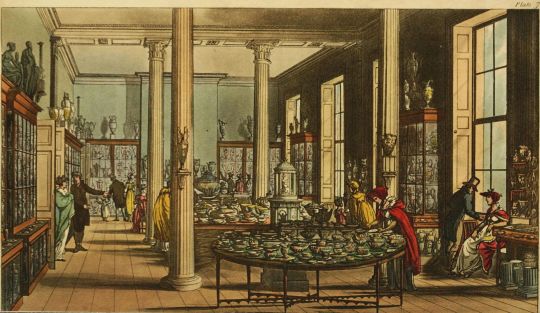
In 1774 Josiah Wedgwood and his longtime business partner, Thomas Bentley, opened a new warehouse, enamelling rooms and most handsome showrooms at 12-13 Greek Street, Soho. In 1795, after Josiah’s death, the Wedgwood studio moved to 8 St. James’s Square and the buildings were later occupied by coachmakers, writers and other artists.
Now, through Word of God we already know that Aziraphale spent the 1600s using his personal savings to gradually buy out portions of the neighboring land in order to build the original bookshop “on Greek Street just off Old Compton”, which finally opened in its current form in 1800.
This means that for the time Josiah’s company operated in Soho, they were at least neighbors.
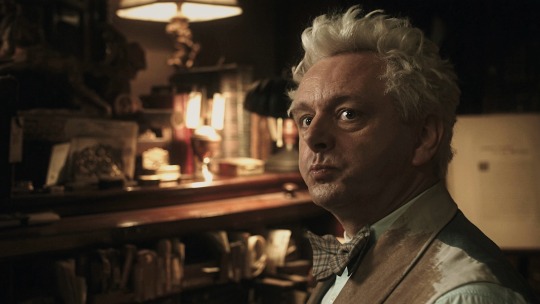
#Yuri is doing her thing#good omens#good omens 2#good omens meta#A. Z. Fell & Co.#aziraphale#aziraphale’s bookshop#aziraphale is a landlord#and has a penchant for legal documents#which sounds a bit too ominous for an angel
489 notes
·
View notes
Text
Bruce is actually really attractive, and I have enough reasoning to make a list
He's:
Tall (. Tall enough to hit his head on the vault doorframe)
Long-legged
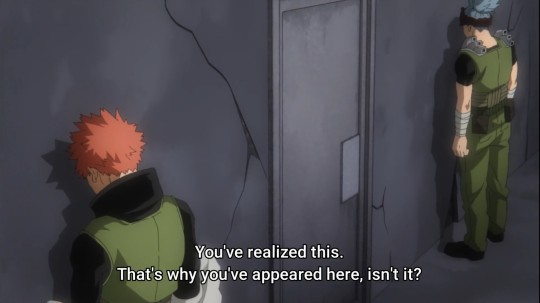

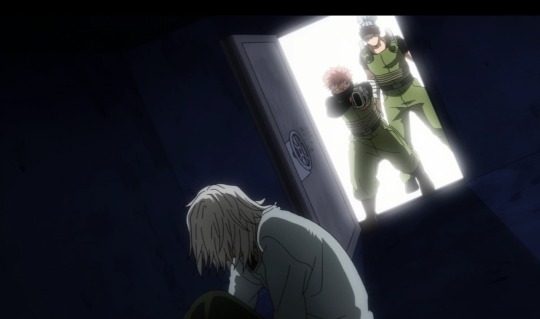
Has a straight nose bridge
Has high cheekbones (more noticeable in 2nd pic below)
Has a strong jawline
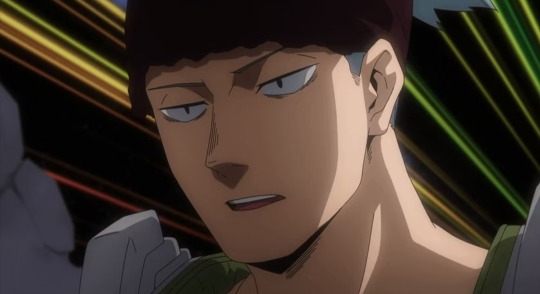
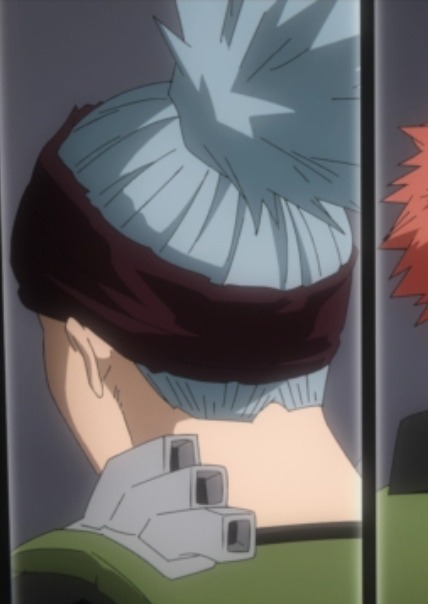
Sharp eyes, but they aren't small (plus eyebags if you're into that)
Overall, he has strong, attractive facial features
Has broad, refined shoulders. You can tell he works out (or he did, when he was alive)
Even has a thick, muscly neck
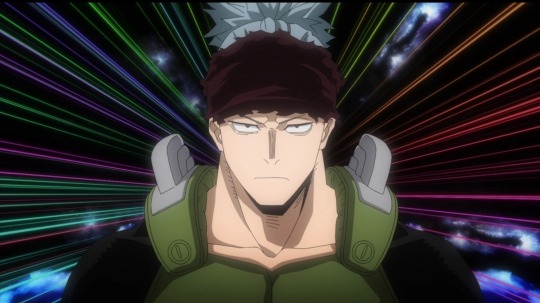
He has MUSCLE. Is SCULPTED. NOICE. VERY NOICE. (nice arms. Nice shoulders. Nice neck. Nice legs. Nice butt-)
(There are actually panels where you can see some of his muscles. Other than those already shown here, he's got bricky thighs-
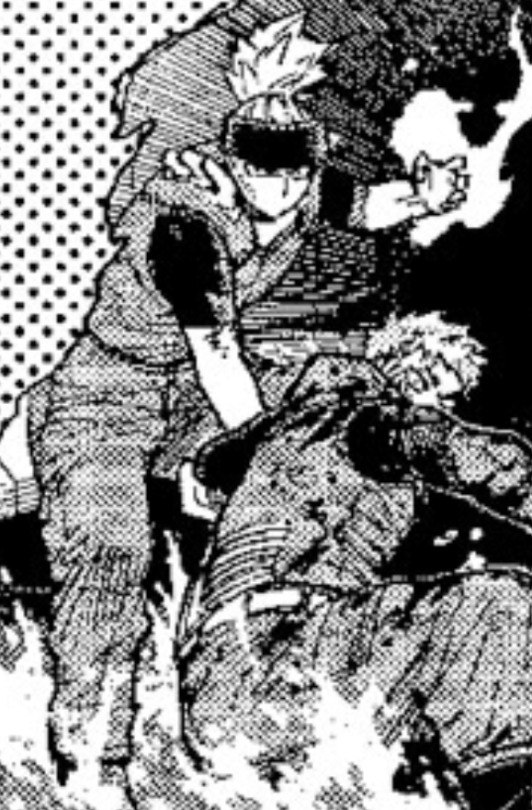
-and in the panels where we first get his name dropped, he's got those shoulder blades too-)
The one time we see him smile, and he actually has a scary one
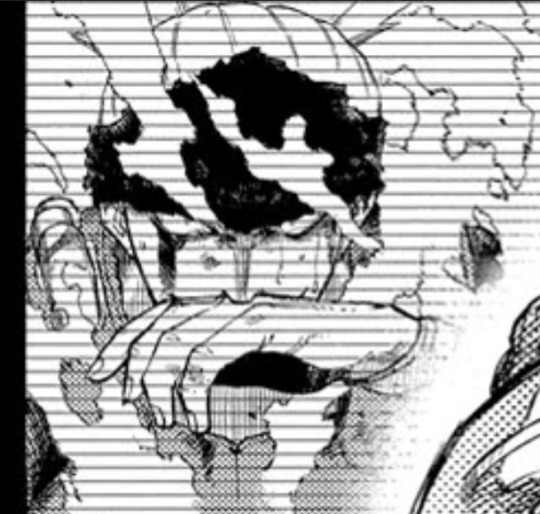
Has small, kinda sharp pupils, and his eyes remind me of a cat. We only ever saw him tense or defensive, so his resting/listening face is really cute
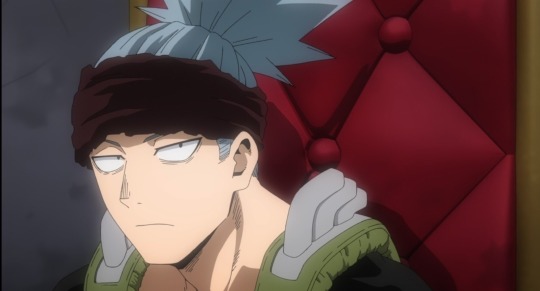
Other than the physical appearance stuff, he also:
Takes shit without batting an eye (patience, knowing it's just how Kudo is, etc)
Kudo being all "Cut the crap Bruce and give it to me straight", after Bruce tests his blood and is rightfully Concerned because they just faced AFO
Put up with Kudo's experimenting and testing over Yoichi's transferable Factor
Did ya'll see the look on Kudo's face when he realized he had Yoichi's Factor/will? Kudo was going to start in nonsense and Bruce just dealt with that.
Also something I noticed when looking back at the images here; Bruce has bandages on his arms in the void. But not when he faced AFO in the sewers.
Were he and Kudo cutting their arms open in their experimenting over Yoichi's theory? Is this why Kudo has two gauntlets instead of his one? Why we never see his bare arms in the void? That he always keeps his arms down so there's no slip?
Is smart enough to run blood tests, plus has enough common sense to pick Shinomori as his successor
He picked a guy who avoids society, has an Ability to detect danger so he can always stay away from AFO, is also a coward so he's never going to go throw himself into danger, even without knowing instinctively he stands no chance, etc.
Meanwhile, Kudo chose Bruce, who he played Hot Potato Yoichi with; but he did also trust Bruce, and put the only pure combative Ability in OFA through Bruce.
These two made their choices based on what they valued and saw the Factor needed.
Is logical, analytical, and calm.
He tried advising Midoriya on their Abilities in One For All, especially his own.
Midoriya then tried ignoring him about using Fa Jin for the first time, but found he was right, thinking: "Dammit!! I had [Lady Nagant] right where I wanted her, but... ugh! The Third was right. My parallel Quirk processes are all screwed up!" (ch. 314).
Plus, when Midoriya fixed his processing mistakes, Bruce was analyzing the way he reached his new conclusion. Pure facts, no bias, very calm, just saying it as it was.
We never see him panic. When he's caught by surprise in the sewers by AFO, Kudo, and Yoichi's little bubble event, he immediately reacts. He doesn't falter, he just knows he has to do something right now.
Was more willing to listen than Kudo to Yoichi's beckon, and probably was just following Kudo's rejection of Midoriya
While we don't see Kudo's face, we see Bruce's eyes when Yoichi calls on his heroes. Bruce was more open and receptive, or at least more impacted.
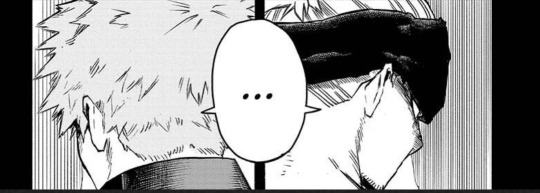
Bruce was also the one to start talking, while Kudo just kept quiet.
He actually communicates a lot
When Yoichi called them to support Midoriya, Bruce started talking to paint a picture of why they thought the way they did, so Yoichi understood where they were coming from.
(Though he seems to beat about the bush sometimes, since Kudo spoke up to be direct on how they couldn't just put their trust in some starry-eyed teenager. Plus, when Kudo tells him to just tell him what's wrong [double Factors])
When Midoriya first used Fa Jin against Nagant, Bruce came out just to tell him he knew what he was trying, but that Midoriya wasn't ready; and Midoriya found he was right. Midoriya just didn't want to listen to him then.
He asks Kudo for clarification after finding Kudo had two Factors in him after the sewer incident ("Just to be sure, All For One didn't touch you, right?") Kudo knew him well enough to go "stop beating around the bush and tell me", so Bruce was probably gonna start with questions, theories, and trying to understand everything in general, before saying "yeah you have two Factors. Don't know why".
Is strong-willed and loyal.
He followed Kudo, even to death, carrying on the cause he started until it ended with him.
Plus, when talking about how AFO needs a strong will to override OFA's own, we first see Bruce, Kudo, and Yoichi.
AFO couldn't steal OFA because the will was too strong for him, and that was back during Banjo's time. Since Shinomori never actually tried opposing AFO and just hid, we can assume the first Three (Yoichi, Kudo, Bruce) already had an accumulation of strong willpower that made OFA un-stealable. Those three are a strong enough foundation, and the main wills, that the other users just become bonuses.
Kudo, also saying that Midoriya needs allies with the same will and drive as him... hey Kudo, you're talking about yourself and your old allies, aren't you? That's why you look at Yoichi and Bruce when you say this.
Not only is Bruce attractive, but he's got good character. THE END.
#yes this is a bruce appreciation post#am i biased? yes. am i right that he has these features? also yes.#hes actually a very attractive person. hes got all the right features for it#plus hes smart (some medical knowledge) is really loyal strong-willed and patient#he puts up with kudo SO much#from being bossed around to taking home yoichis brother to whatever the heck kudo made him do to figure out OFA's transfer properties.....#i didnt think much of bruce originally#then i started doing resistance fic stuff and now hes a fave#hes a little blorbo#that i throw in terrible situations for my own entertainment#used his scary smile for comedy purposes#like when he made a kid cry once. or when a meta child was afraid of him so they bit him#has patience to deal with kudo and co. but also. has enough bite to snark them. is how i like writing him#oh? background character? well lemme just *picks him up* EXPAND ON THAT-#fic stuff: he tries making a good impression on a girl and kudo is ruining it immediately#he doesnt know what to do because the two always banter#kudo: fuck you#oc: fuck me yourself you coward#he sees through a rose-lens that kudo is trying to rip off his face#appeciation kinda turned analysis in general#bruce#kudo#yoichi shigaraki#bnha#mha#spoilers#boku no hero academia#my hero academia#NOT YOICHIS BROTHER. i meant Yoichi / AFO's brother in a prev tag up there but theres too much tags i dont wanna rewrite to fix that#(image limit and tag limit)
297 notes
·
View notes